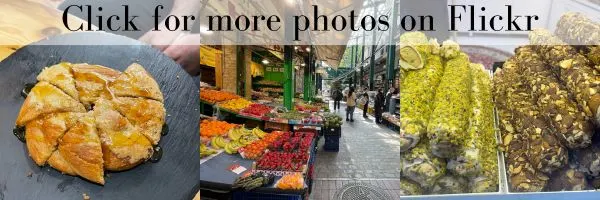Come to Thessaloniki and you’ll taste some of the best food Greece has to offer. A short stroll through Kapani market will showcase the bountiful produce from land and sea and a melting pot of Greek, Ottoman and Jewish influences in the cuisine. In this Unesco City of Gastronomy we uncover the delicious food in Thessaloniki, and the best restaurants, dishes and pastries you’ll want to try.
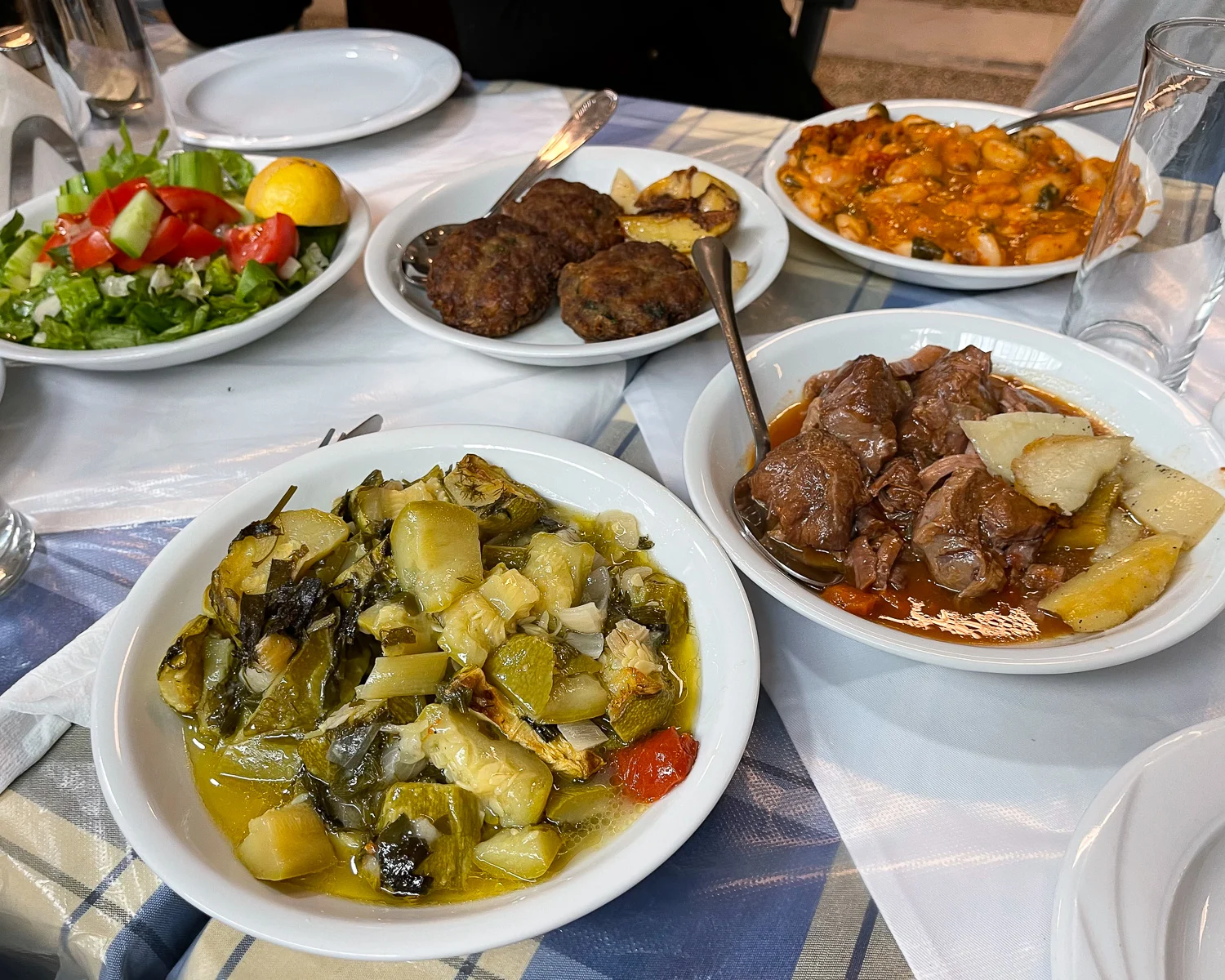
Located at the heart of the Byzantine Empire, with trading links to north Africa and a diverse population, Thessaloniki has always had a cosmopolitan outlook.
A great fire in 1917 which destroyed half the city, the forced population exchange of 1923, earthquakes and wars have created upheavals, but the multicultural influences on the cuisine have remained.
Today Thessaloniki has an air of prosperity and a large student population. Restaurants set their tables out on pavements and squares for coffee or lunch in the sunshine. Acknowledged as the “food city” of Greece, you’ll find ambitious chefs at the cutting edge and a creative food culture.
With stylish brunch spots, trendy late night bars, modern Greek cooking, traditional tavernas and colourful markets, this is a city to experience the broadest range of Greek cuisine. For more about the history and culture of Thessaloniki, read my article on the best things to do in Thessaloniki.
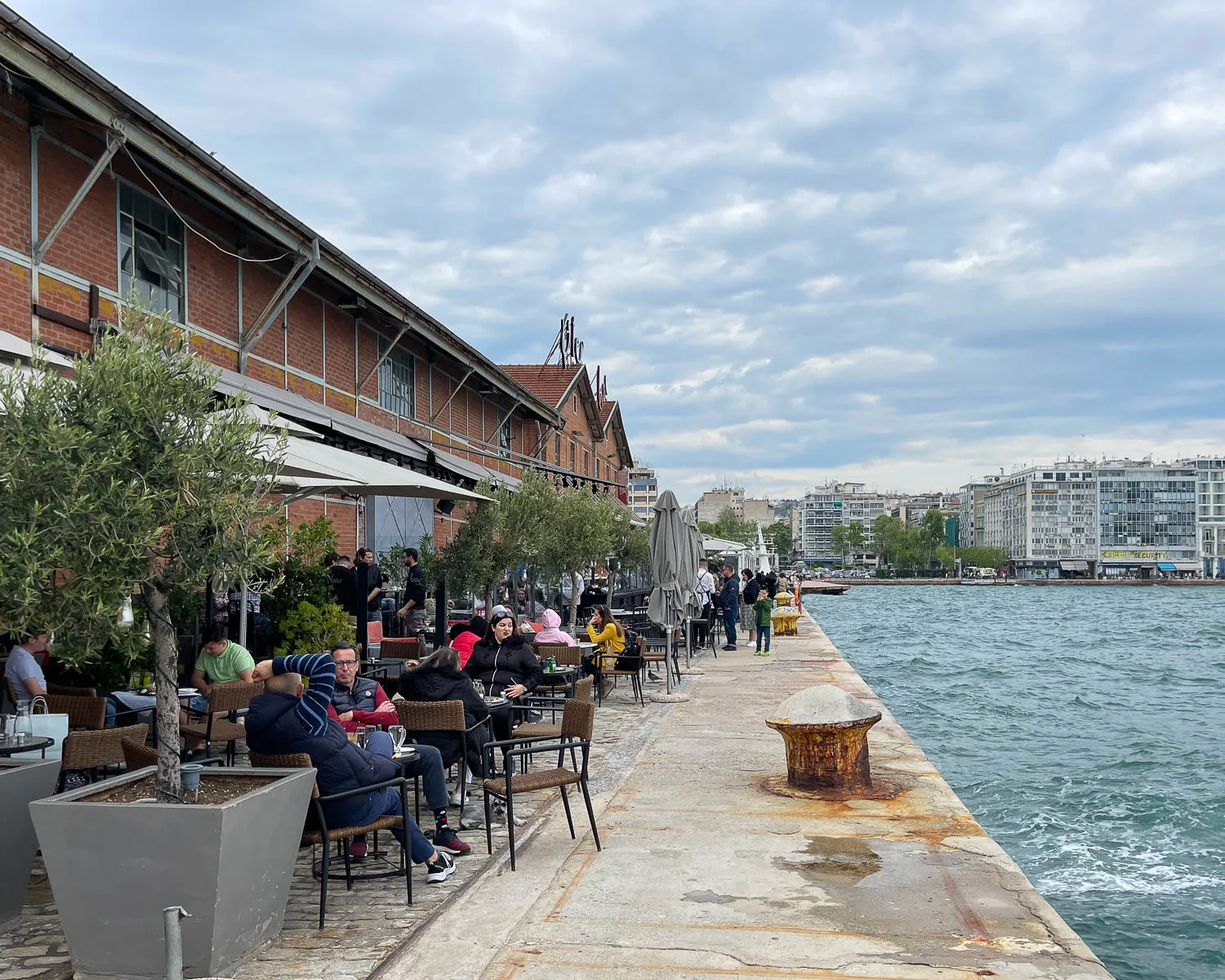
This article may contain affiliate links that provide commission on purchases you make at no extra cost to you. As an Amazon Associate I earn from qualifying purchases.
Where to eat in Thessaloniki
As the second largest city in Greece, Thessaloniki has hundreds of restaurants, bars and cafes, so there’s a seemingly endless choice! To help you find the very best restaurants in Thessaloniki, we’ll recommend those we personally tried or heard good things about.
But first let’s highlight some of the most popular neighbourhoods for eating out, where you’ll find a number of excellent restaurants clustered together.
Best neighbourhoods for eating out in Thessaloniki
Ladadika – just behind the old port this quaint area has become one of the most popular districts for eating out. Some streets, (especially around Emporiou Square) are busy from lunchtime and late into the evening, while the morning offers cool places for a coffee.
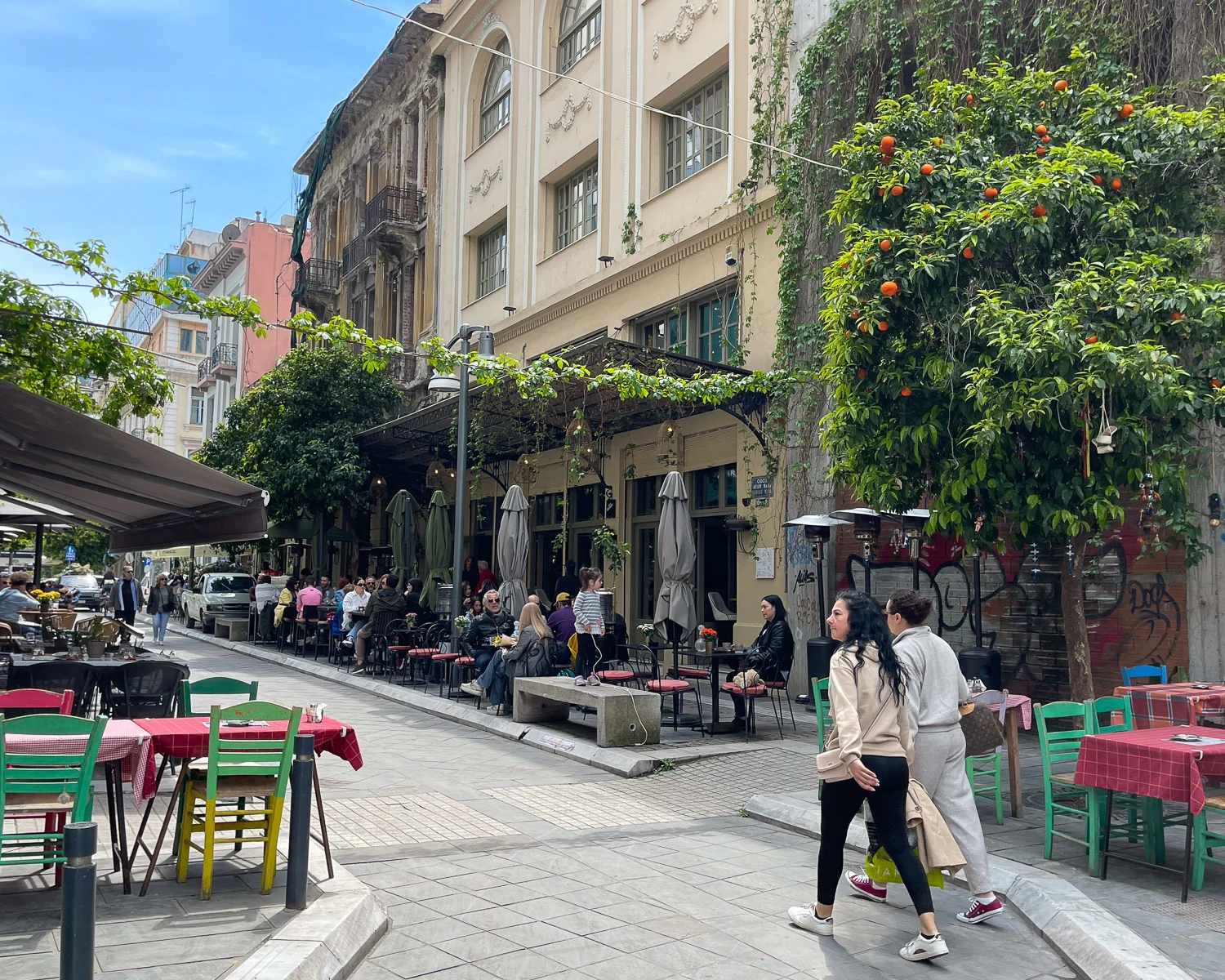
Seafront and Aristotelous Square – the Leof. Nikis road running along the seafront between the old port and White tower is lined with restaurant offering sea views, although a road divides the restaurants from the sea. A couple of blocks behind the seafront and around Aristotelous square are also prime eating out territory.
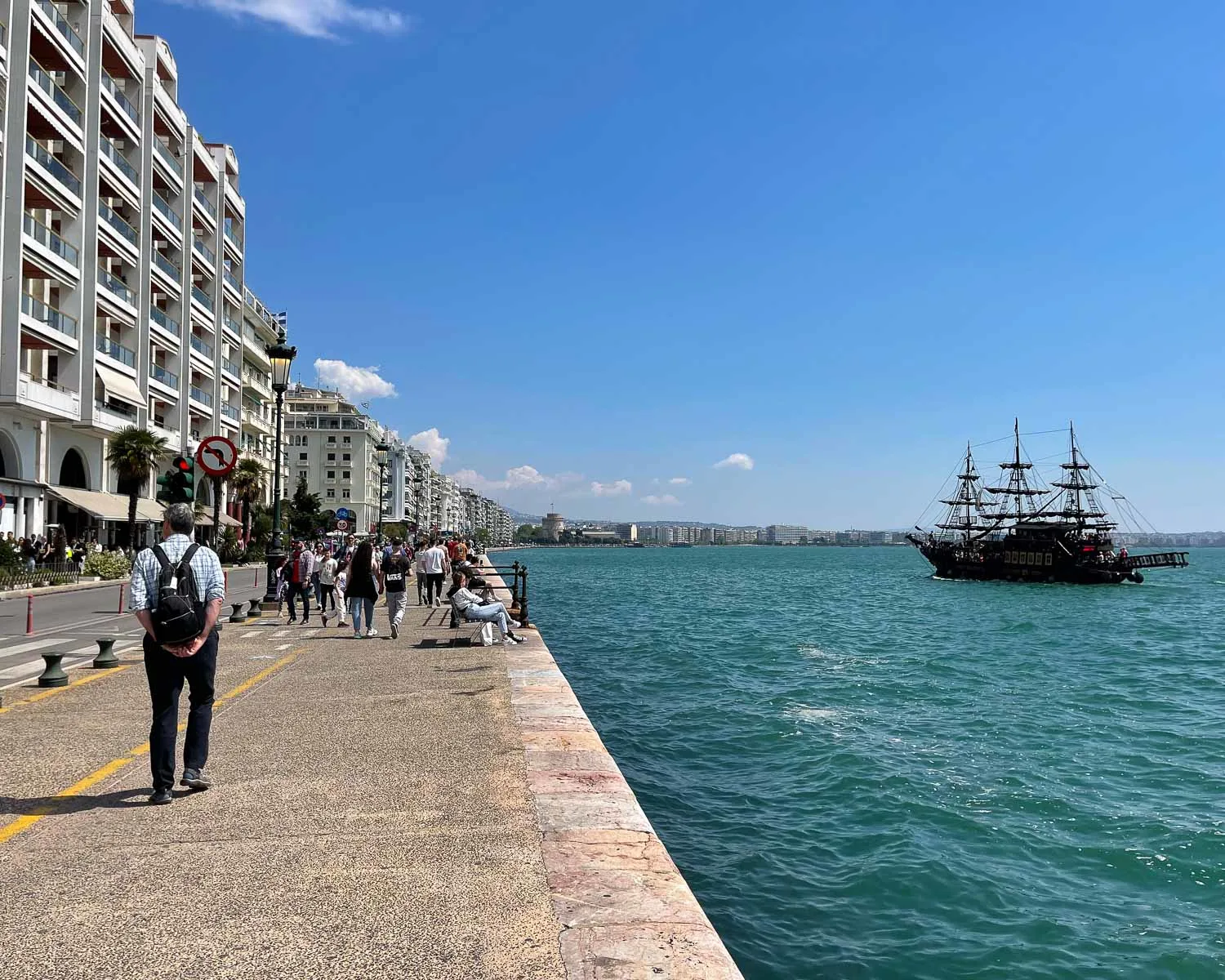
Ano Poli / Tsinari – while much of the upper town is a residential area, there’s a cluster of charming restaurants around Tsinari, of which the best known is Ouzeri Tsinari. If you locate this on the map, there are several more restaurants along the same cobbled street.
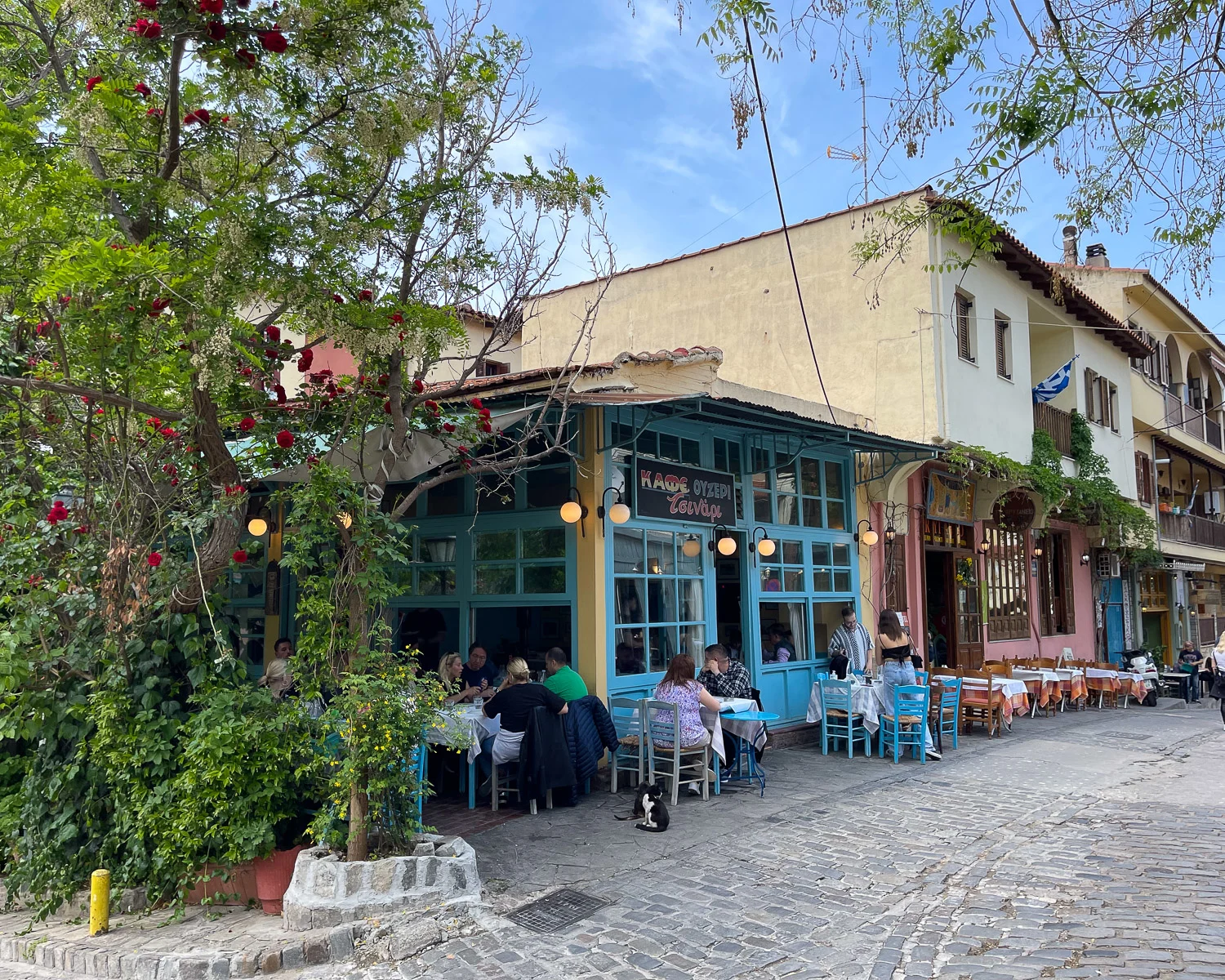
Vatikioti Market and Athenos Square – the restaurants around Athonos Square and the Vatikioti market are quiet during the day but come alive at night when pedestrianised lanes are packed with restaurant tables.
Valaoritou – merging into Ladadika, Valaoritou is a well known nightlife district that appears dead during the day, but comes to life at night when it’s full of stylish bars and clubs. In summer, seek out the trendy rooftop bars such as Stin Taratsa (Valaouritou 29)and Urania (Paiko 4).

Stay at 7PocketHouse – a charming budget guest house with vintage style in Ano Poli
Best restaurants in Thessaloniki
Meze culture is strong in Thessaloniki and you’ll find excellent Mezedopoleía (restaurants specialising in meze) in every neighbourhood, offering small and large plates designed for sharing.
A variation on the meze restaurant is the Ouzeri (serving the traditional Greek spirit Ouzo) or Tsipouro restaurant (serving the anis flavoured Tsipouro).
A taverna is an inexpensive neighbourhood restaurant serving traditional Greek dishes while a koutoukia is a small and authentic family run restaurant where you may find live folk music being played.
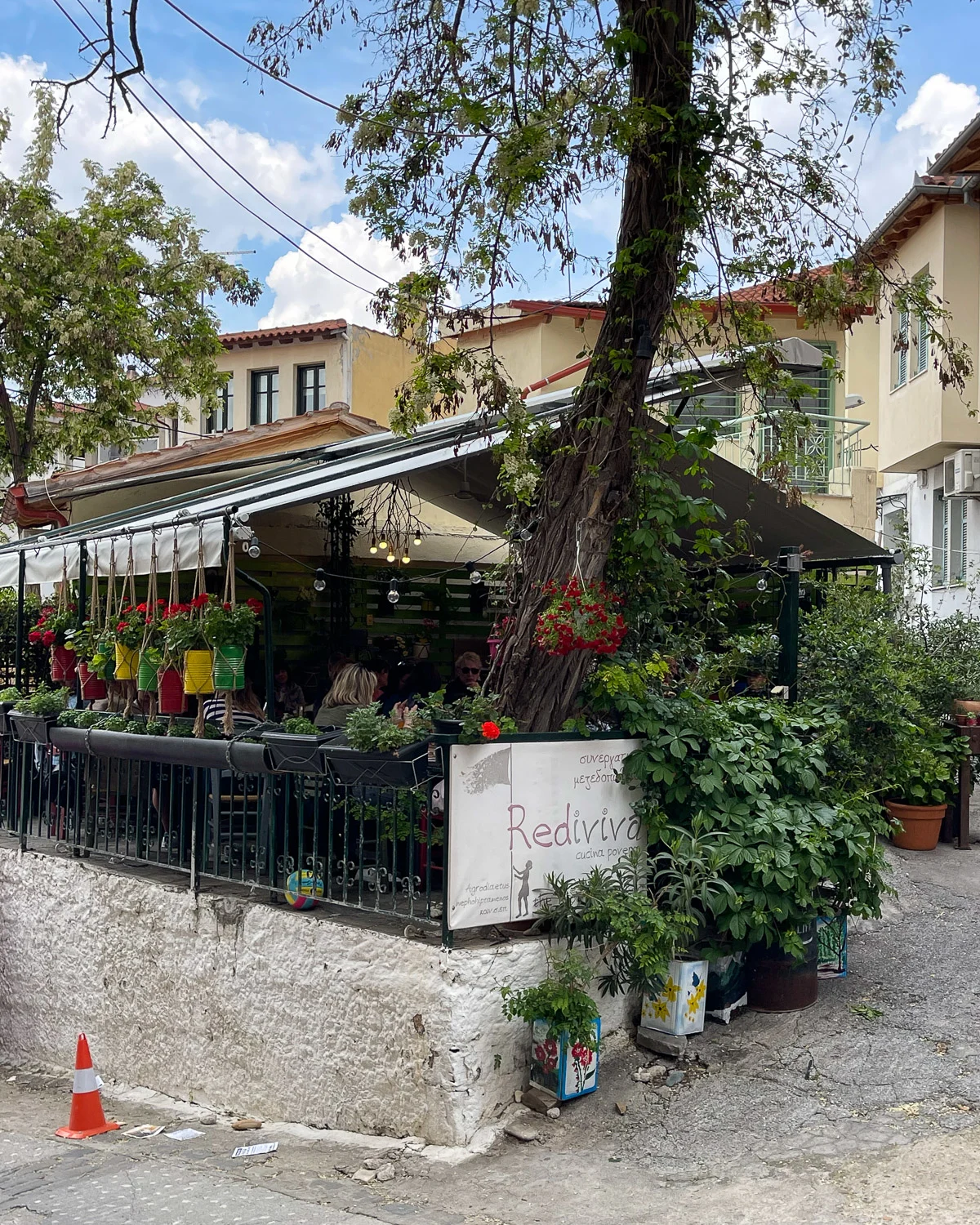
Traditional Greek restaurants in Thessaloniki
Here are some of the more traditional restaurants in Thessaloniki that we personally tried or heard recommended.
Ouzeri Tsinari (Ano Poli) – a charming and inexpensive neighbourhood restaurant serving traditional sharing dishes. It was so good we went here more than once!
Rediviva Cucina Povera (Ano Poli) – a few doors down from Ouzeria Tsinari with an outside terrace. The sharing plates were excellent and they specialise in Tsipouro, with numerous different bottles on the shelf inside.
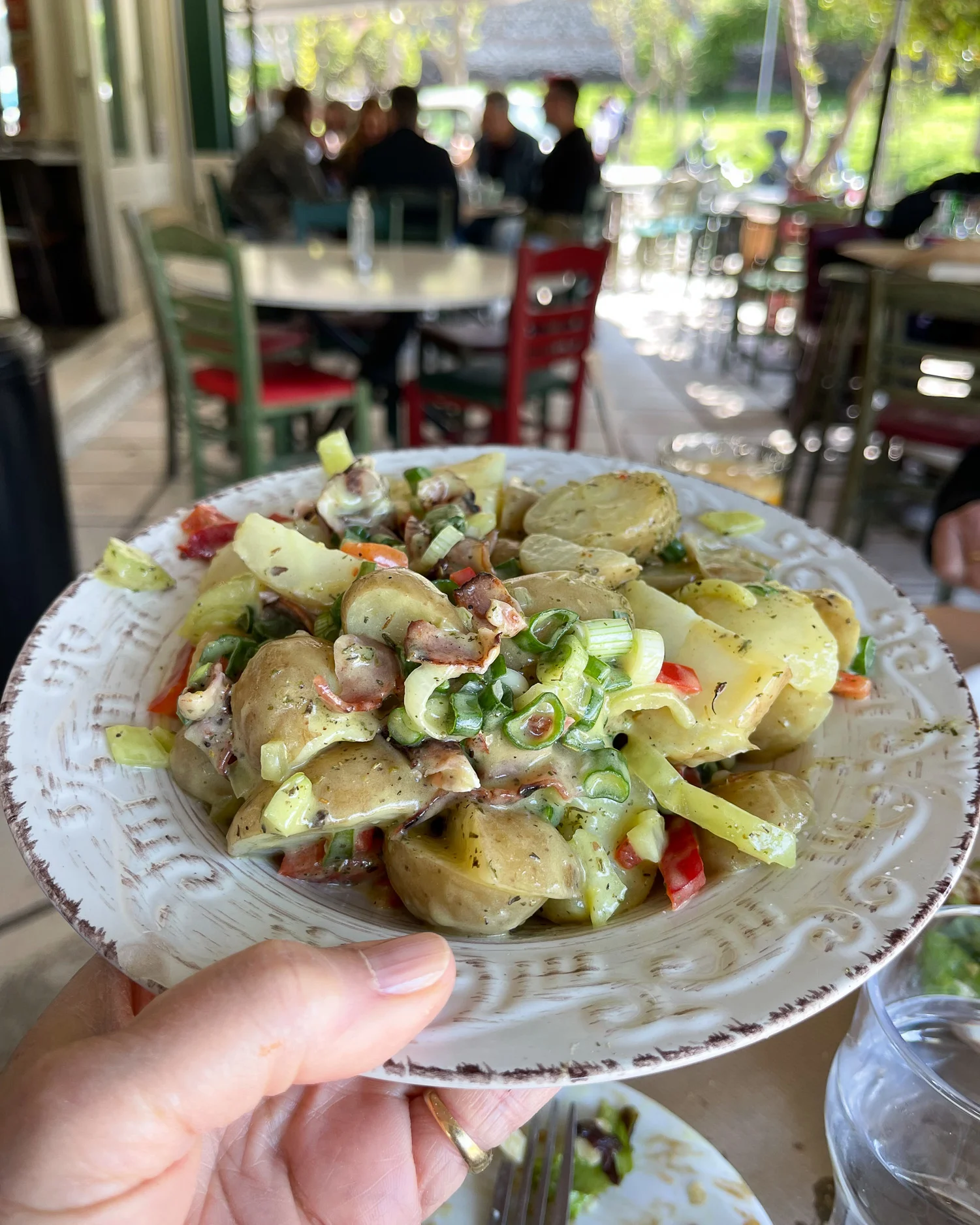
Wall by Wall / Toixo Toixo (Ano Poli near the old walls) – a vintage style cafe / restaurant that offers a fusion of Mediterranean cuisine and Greek meze dishes. It’s an excellent place for lunch near the Trigoniou Tower and old city walls.
Taverna O Thodoros (Paparrigopoulou 15) – a traditional taverna in a residential area that’s a little out of the centre with good food and reasonable prices, and live folk music when we were there.
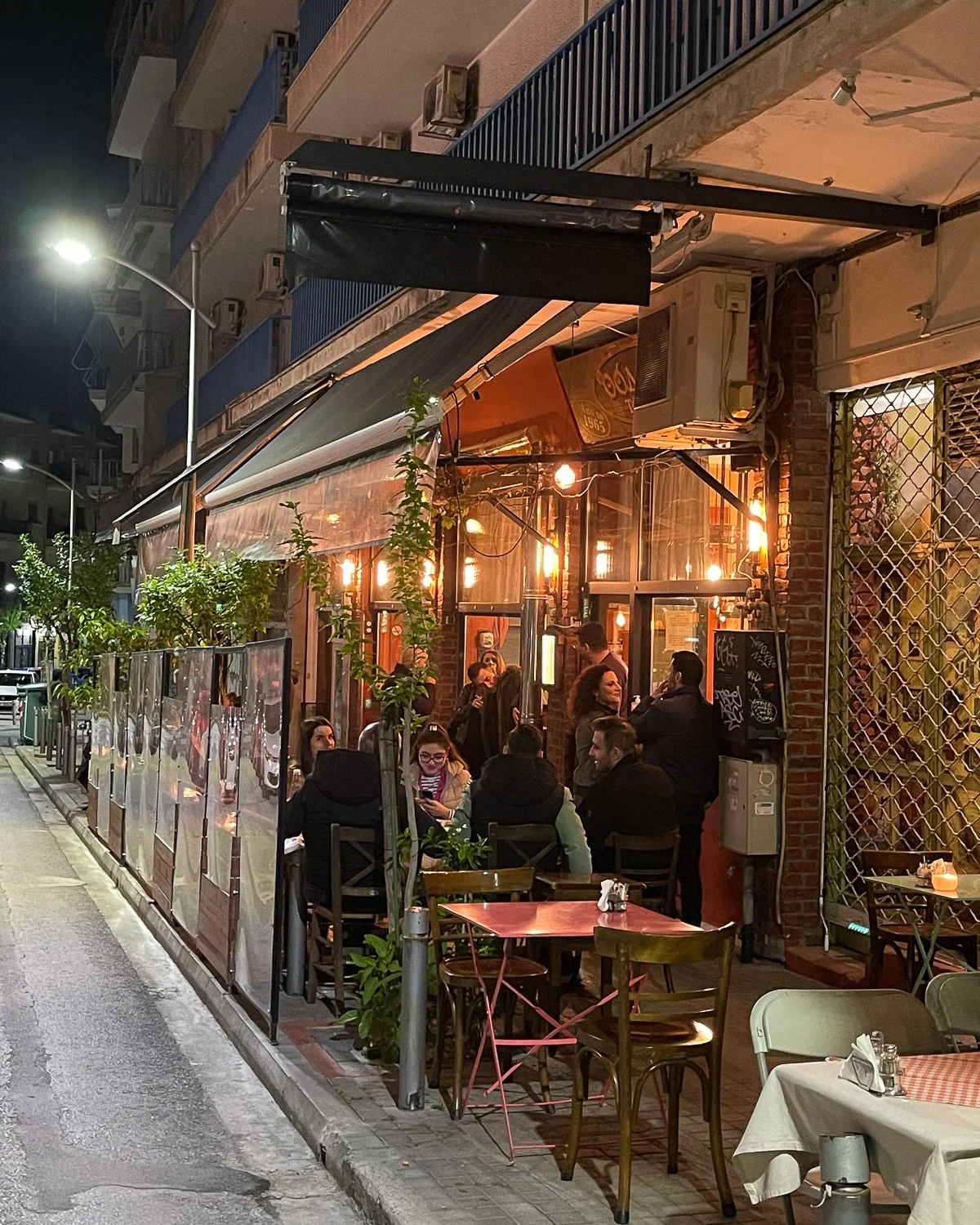
Full Tou Meze (Ladadika) – this place is consistently recommended for its excellent traditional Greek food, reasonable prices and pleasant location in the heart of Ladadika.
Mezen Salonika (Ladadika) – part of a small chain and also regularly recommended although we didn’t eat there, they serve Meze and Tsipouro in the style of Volos, another Greek city where it is especially popular.
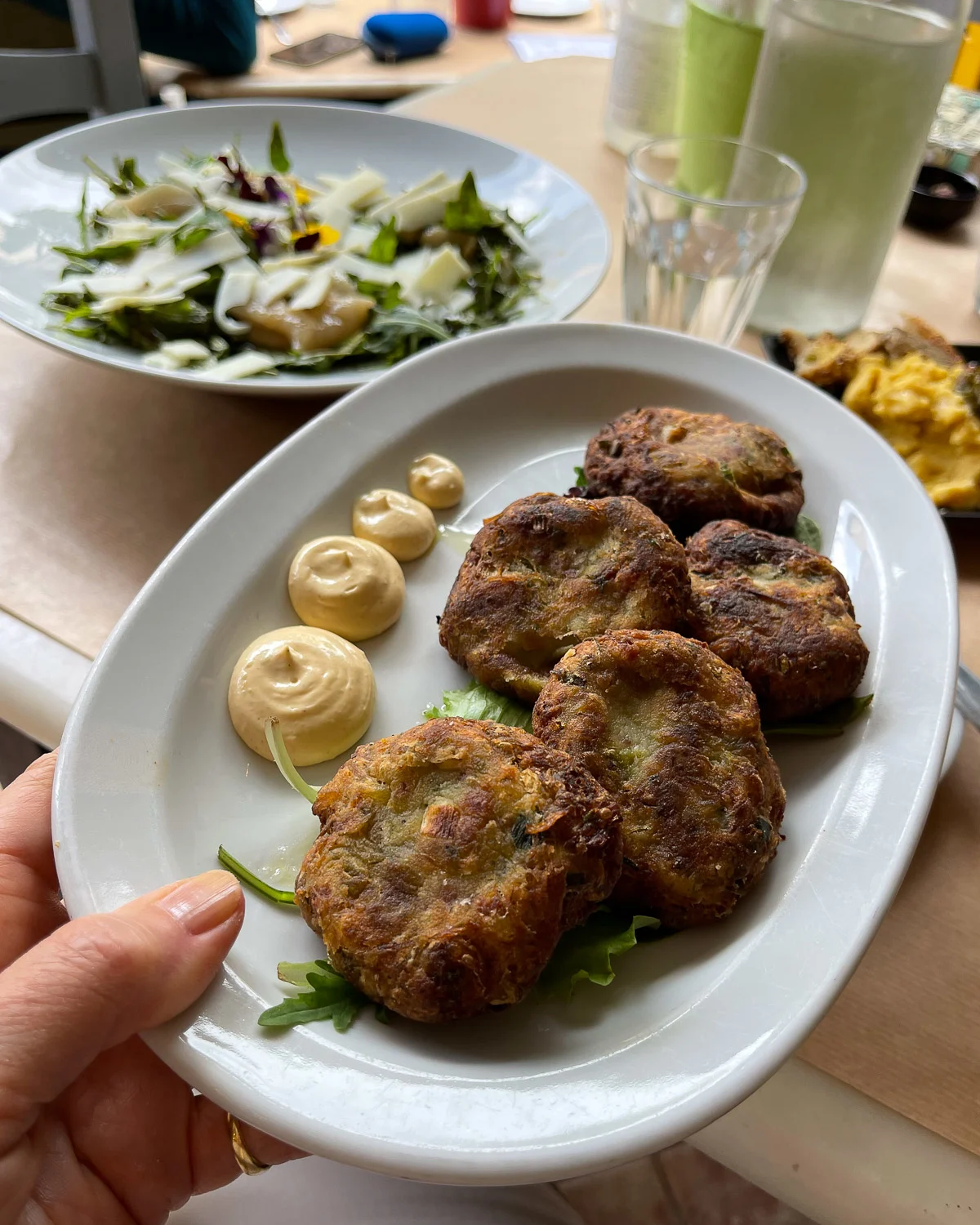
To Elliniko (near White Tower) – traditional and well established Greek restaurant serving meze and main plates, visited by UK chef Rick Stein for his Long Weekends TV series.
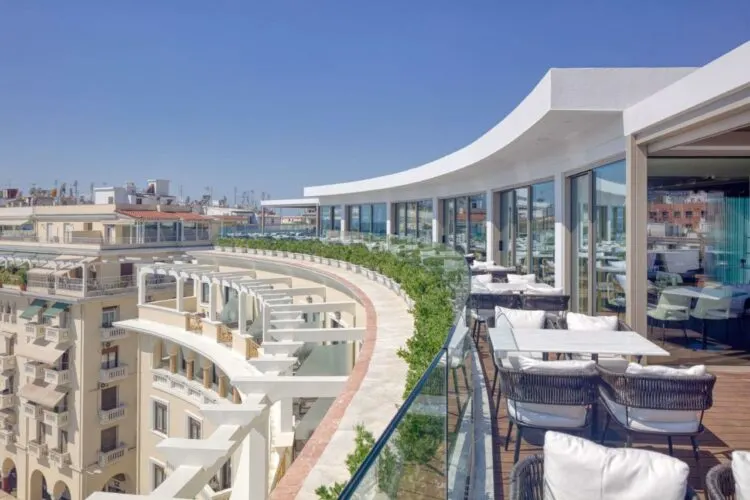
The Electra Palace is a luxury hotel with rooftop restaurant and pool, in a prime position overlooking the main square
Modern Greek restaurants in Thessaloniki
There are numerous ambitious Greek chefs who elevate traditional Greek cuisine, with stylish presentation and a modern twist on local ingredients. Expect service is that bit more polished and gourmet food in a relaxed setting.
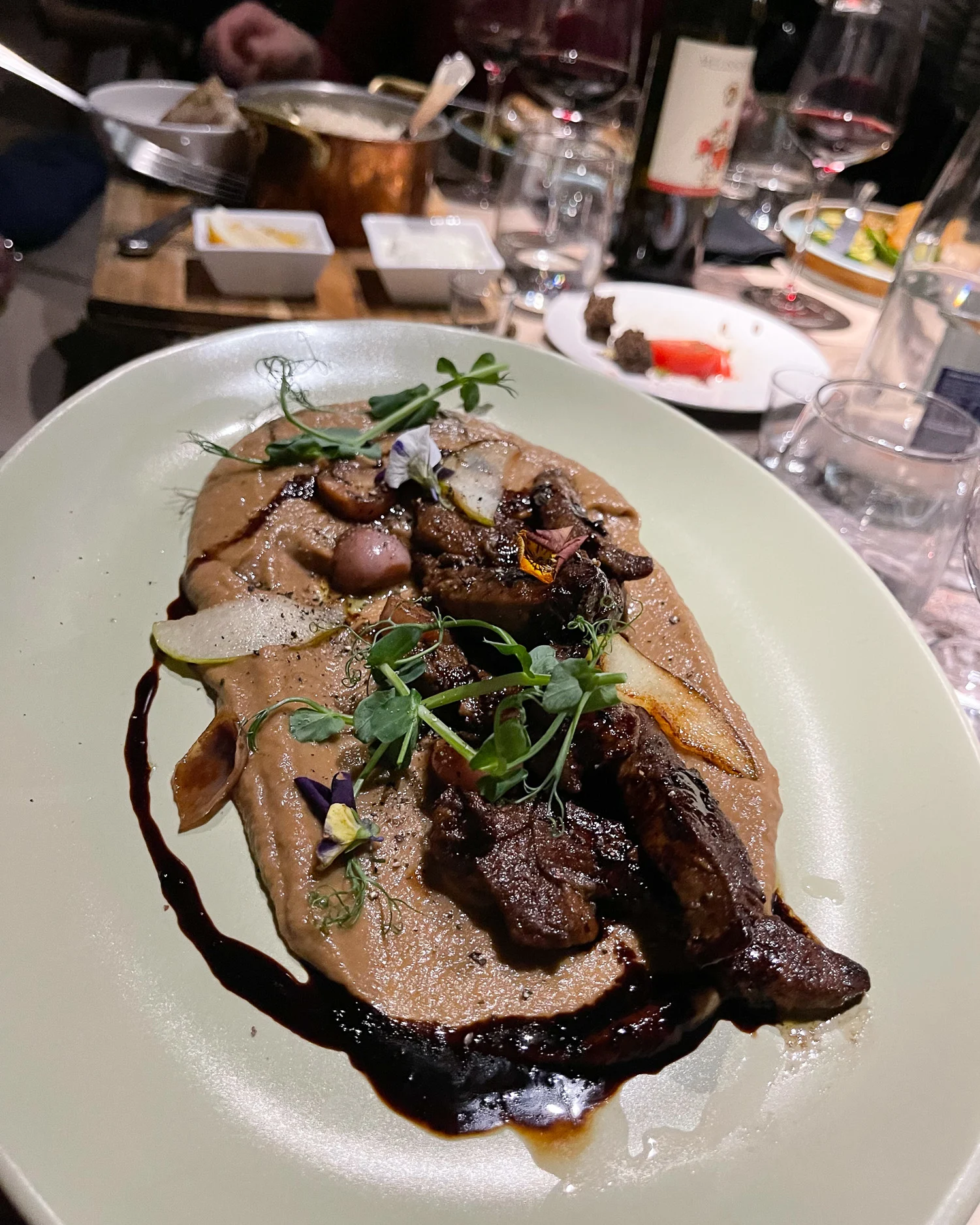
Charoupi / Xaroupi (Doxis 4 Ladadika) – This was one place we dined that exemplifies modern Greek cuisine in Thessaloniki. The restaurant specialises in Cretan cuisine and the ambiance is relaxed yet with sophisticated presentation and attentive service.
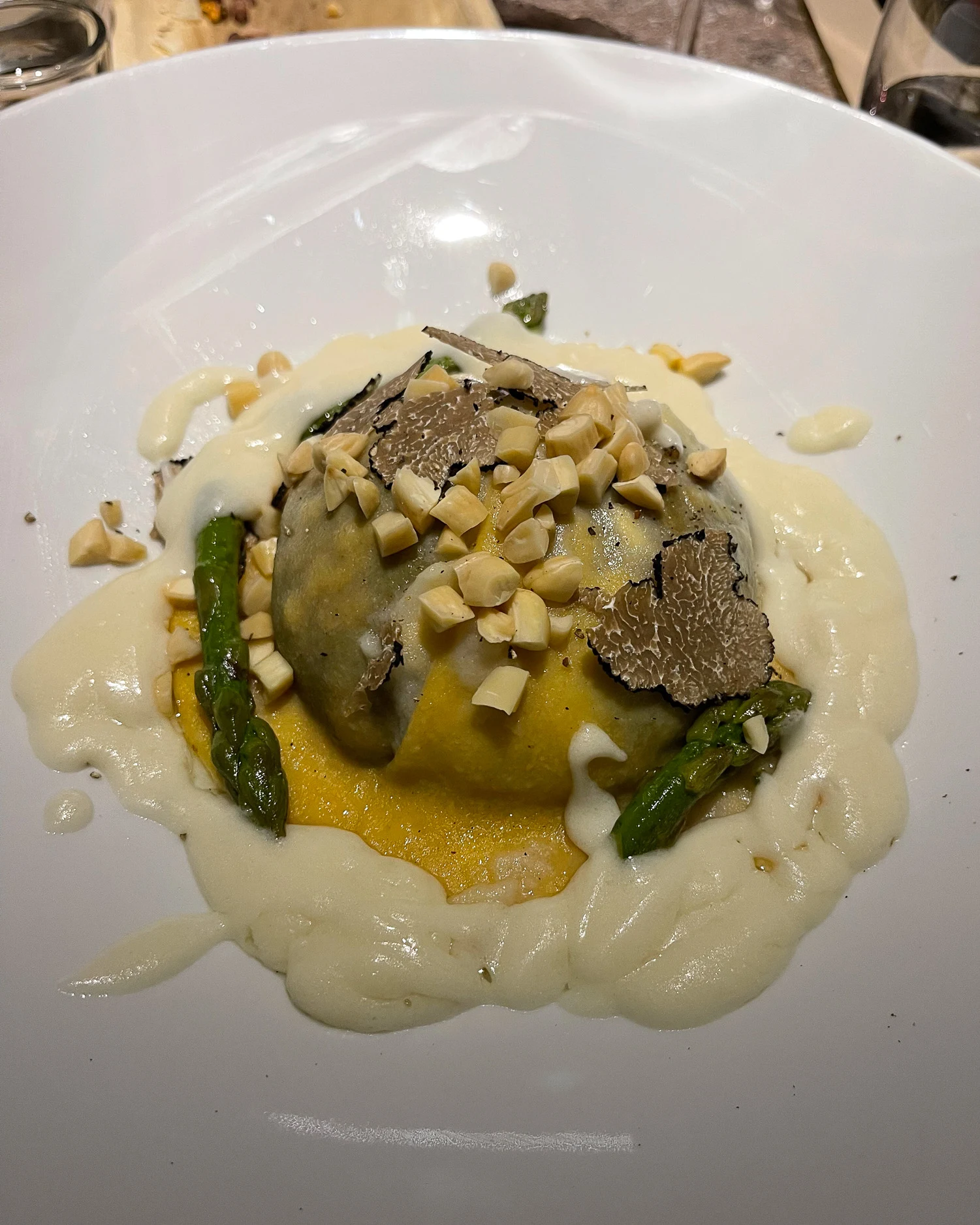
Extravaganza (Episcopou Amvrosiou 8) – although we didn’t eat here ourselves, we heard this restaurant mentioned for the creative and beautifully presented take on Mediterranean and Greek cuisine.
Vegetarian food in Thessaloniki
Vegetarians may find some tasty vegetable dishes on the standard menu of restaurants that specialise in meze plates.
Markets and delicatessens are also an excellent source of fresh seasonal produce for picnics or self catering, such as the Naoussa peaches, local cheeses or Halkidiki olives.
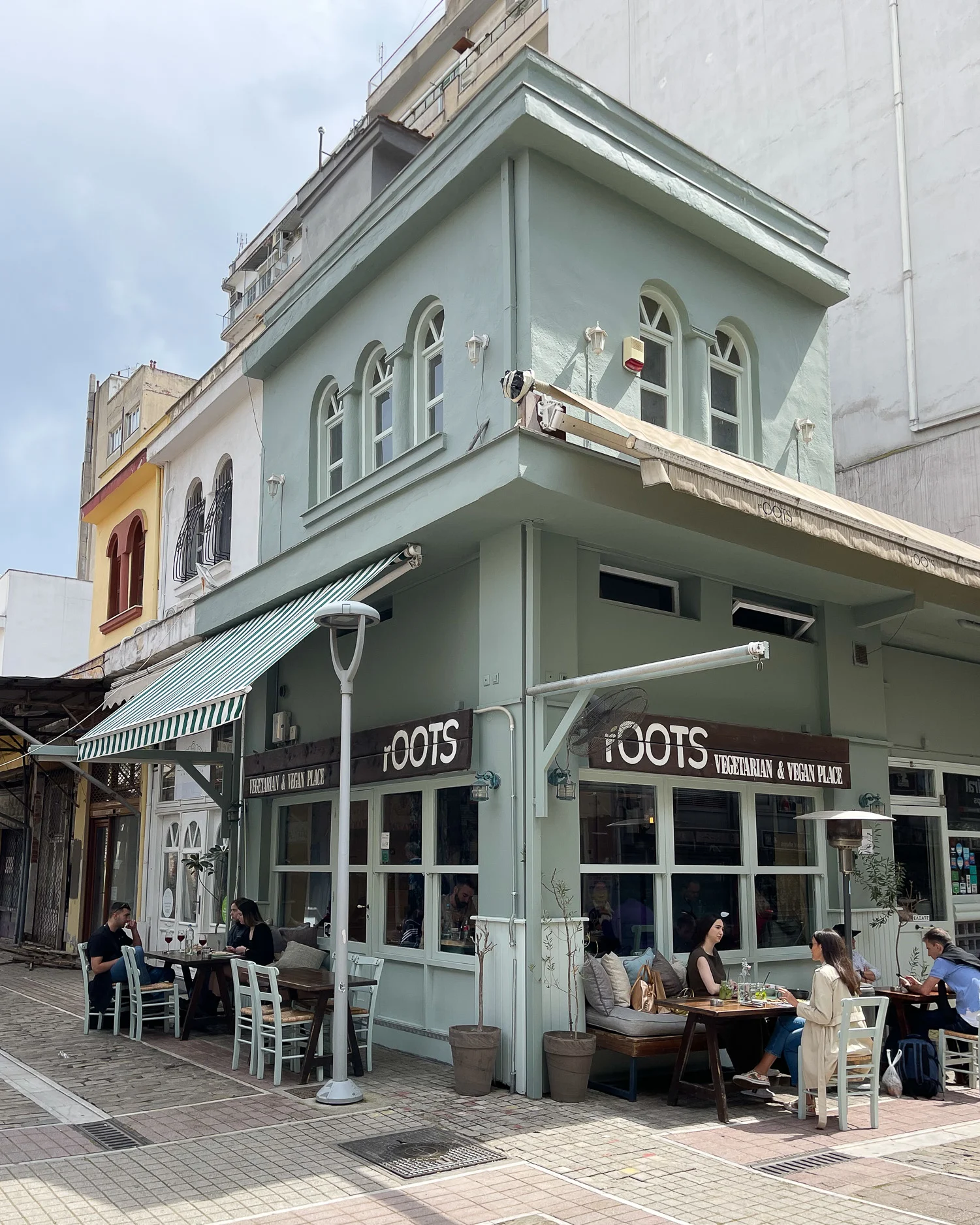
If you are vegan or want a wider choice of vegetarian cuisine, try rOOTs vegetarian and vegan (Mpalanou 4 in the Athenos Square market) or Tarantoula (Olympou 127 near the Rotunda)
Seafood in Thessaloniki
Kapani market is a wonderful place to browse the fresh fish stalls to check what’s locally caught and available in the market.
Being located on the Thermaic Gulf and close to the peninsula of Halkidiki, Thessaloniki has a bountiful supply of locally caught fish and seafood.
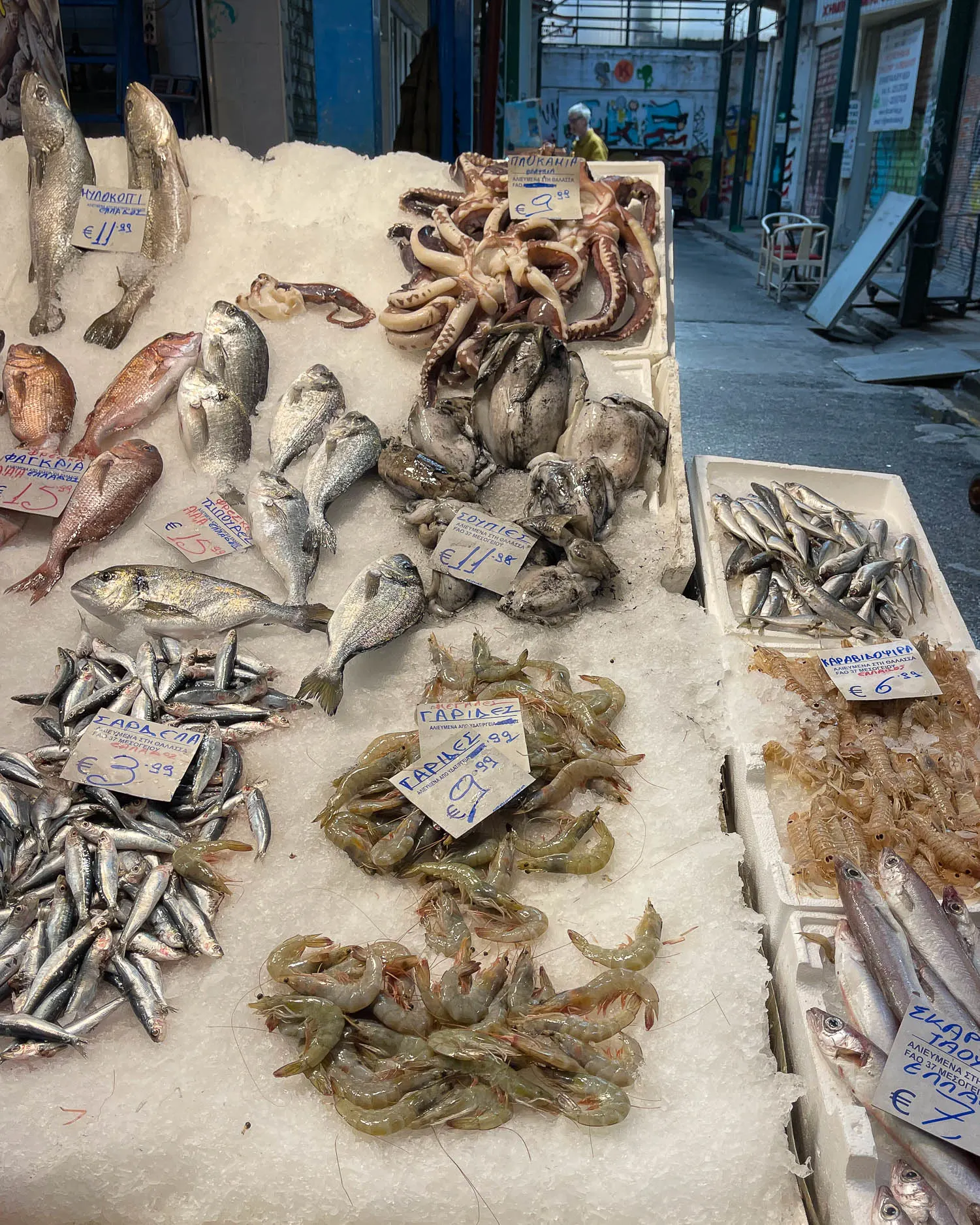
Look out for the fresh mussels that are farmed near Thessaloniki in the wetlands of the Axios Deltra National Park. They are widely used in risottos and pasta dishes, or cooked with a rich cheese and tomato sauce to make mussels saganaki.
A popular place to go to eat seafood is the suburb of Kalamaria, where there are several seafood restaurants close to the beach and marina, such as Maiami Seafood Restaurant.
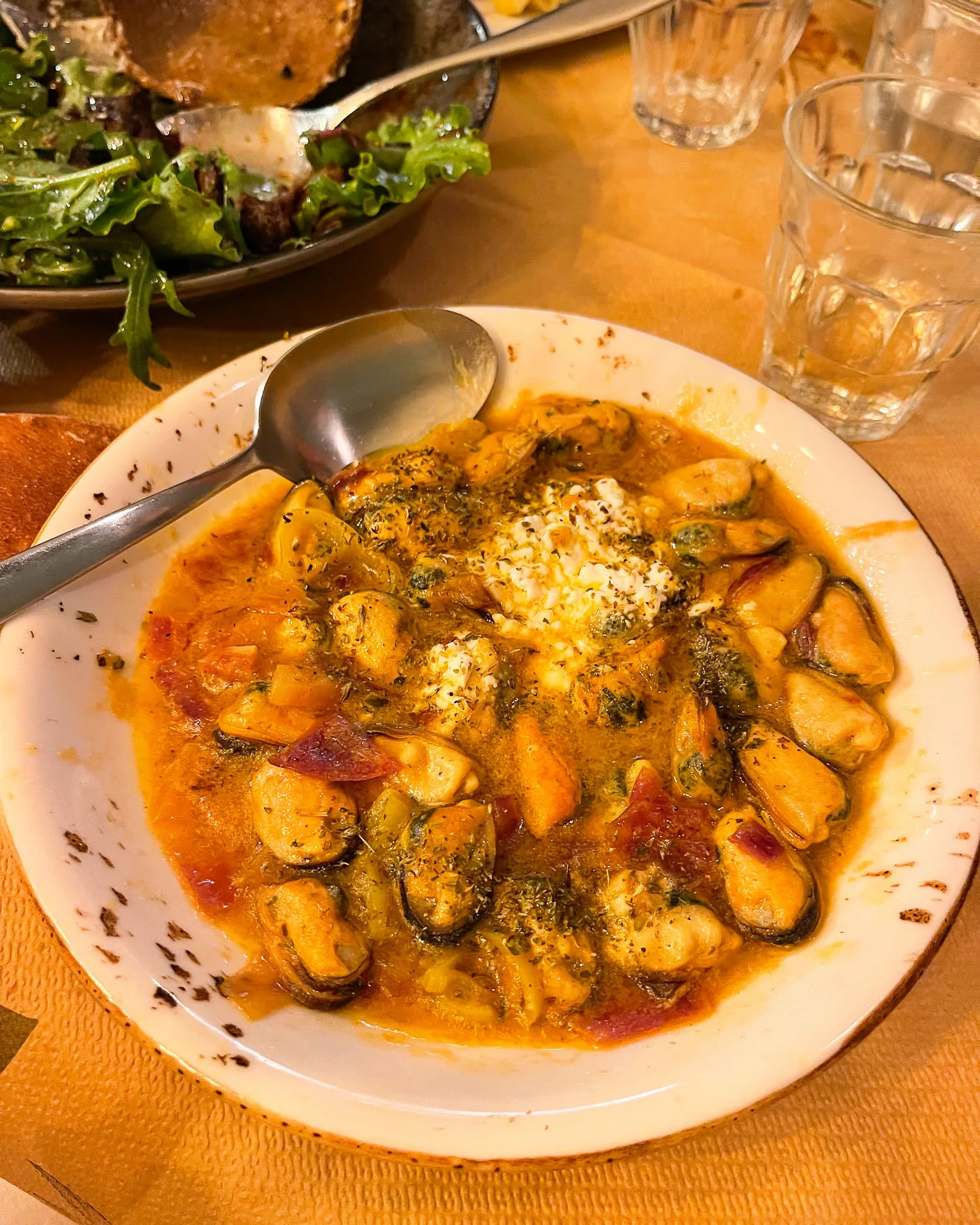
Fish restaurants in Thessaloniki
In Thessaloniki, check out these seafood restaurants:
Kritamos Meze Bar (Tirolois 38 in Toumba) – specialising seafood meze plates with Tsipouro, in the style that’s popular in the city of Volos.
Marea sea spirit (Margariti Lori 13 near the White Tower) – An upscale oyster bar and seafood restaurant offering modern Greek cuisine.
Bajayazi (Vasileos Herakliou 35 near Modiano market) – a taverna style restaurant specialising in seafood that’s a little tucked away in the covered Greek Market.
Ouzerie Lola (Agapinou 10 near the Rotunda) – a traditional ouzeri serving small plates and specialising in seafood.
In the meze restaurants and more traditional tavernas, seafood is often accompanied by the anise flavoured spirits Ouzo or Tsipouro.
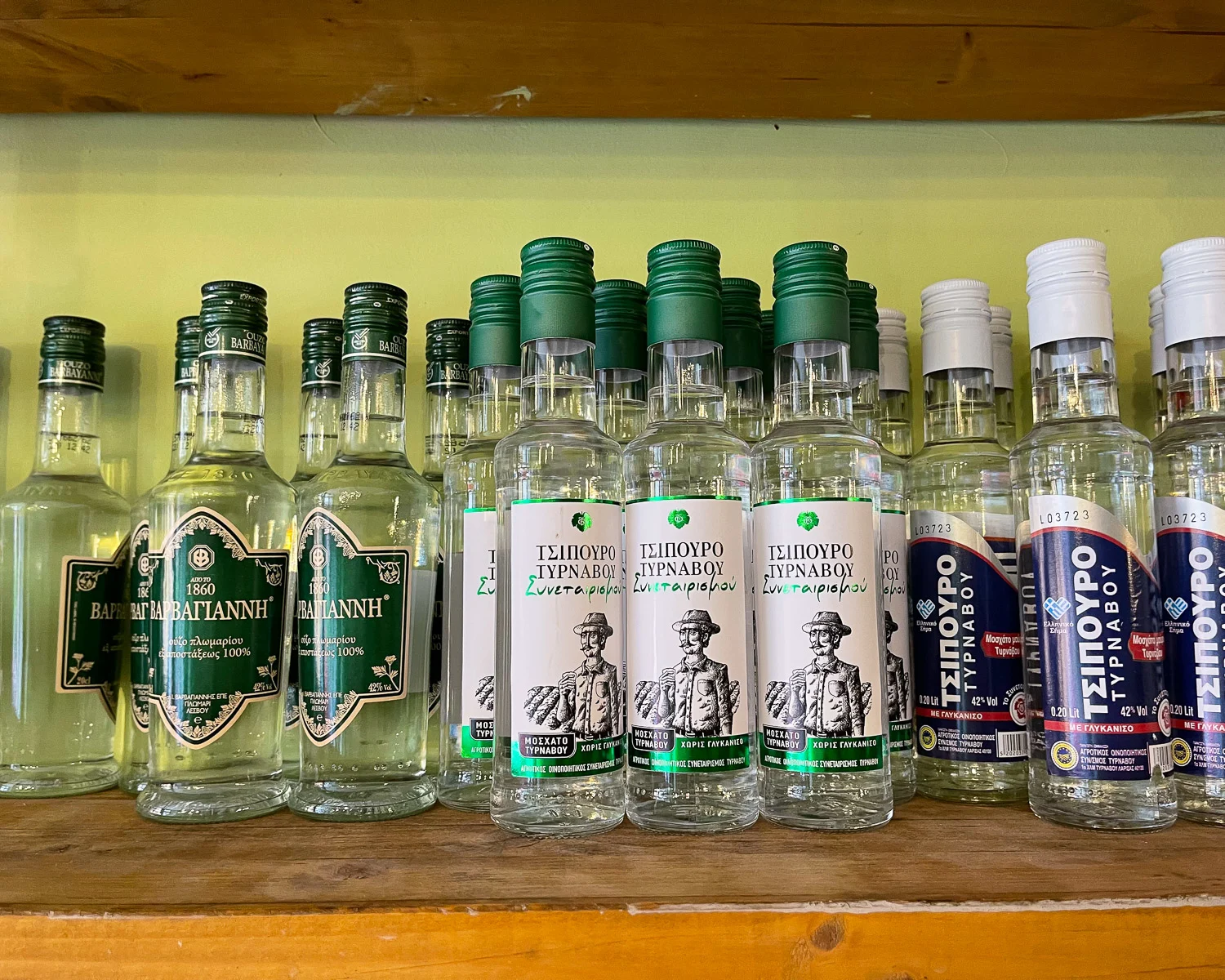

Colors Urban Hotel – a colourful modern hotel with urban style in the Ladadika neighbourhood
Food tours in Thessaloniki
We love taking food tours as a way to dive into the local food culture and get some valuable restaurant recommendations – here are some that we recommend.
Culinary walking tour of Thessaloniki – This 3 hour tour which we tried takes you around the markets and specialty food shops with multiple tastings and a lunch in one of the traditional tavernas. *Tried and tested by us!*
Walking open market food tour and tasting – This 2 hour walking tour takes you to the open air markets of Thessaloniki to try a Greek coffee and sample some of the traditional foods and produce.
Thessaloniki Bike tour – If you like to stay active, this 3 hour tour takes you cycling around some of the city highlights.
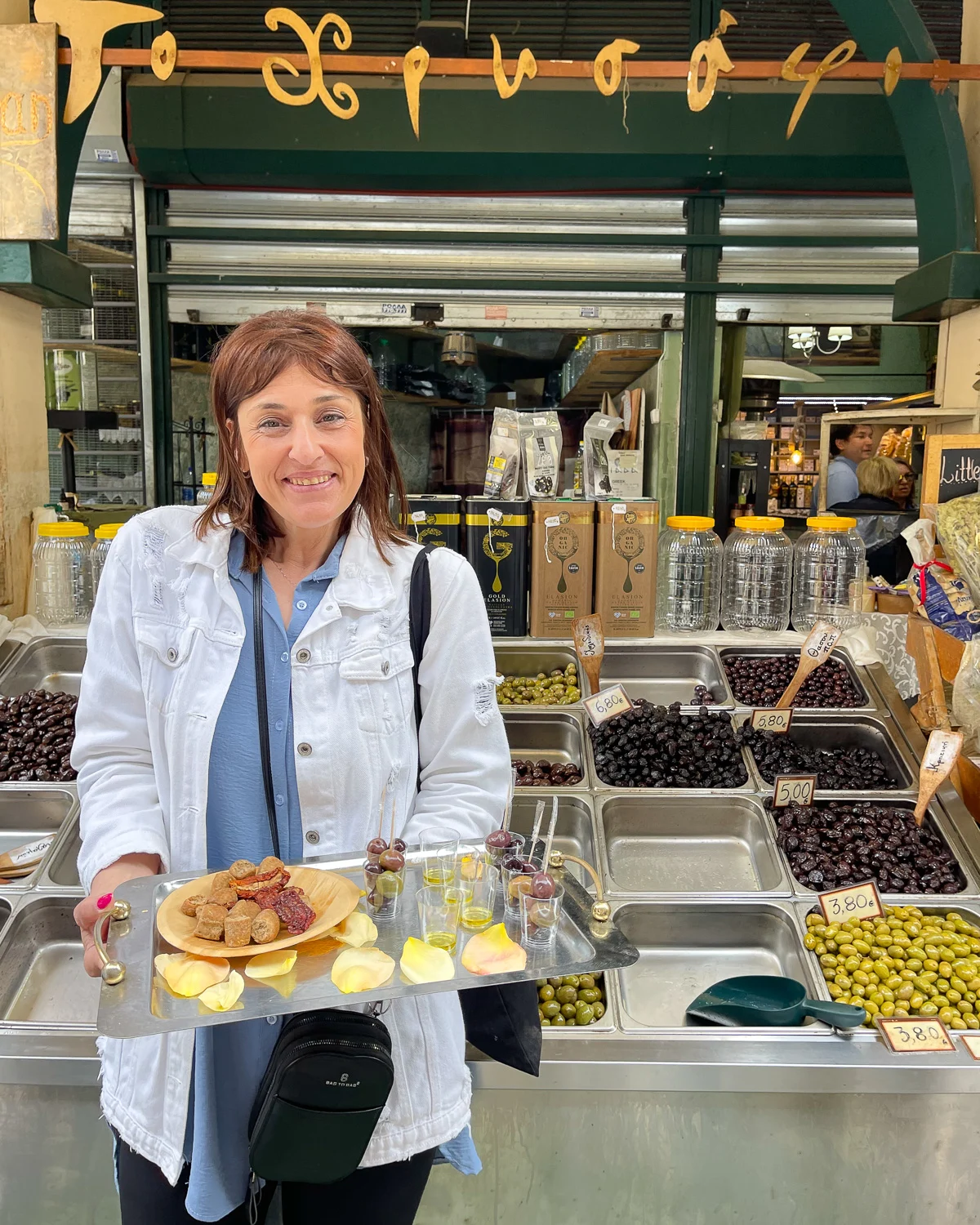
Ready to plan your trip? Read about all the best things to do in Thessaloniki Greece
Coffee in Thessaloniki
As a student city, there’s a strong coffee culture in Thessaloniki, from the Kafenion (traditional coffee shops) serving strong black Greek coffee, to the trendy coffee bars of Ladadika and Valaoritou.
The popular Greek summertime drink of Frappé was invented here in the 1950s by a Nescafe employee at the Thessaloniki International Fair, who couldn’t find any hot water for his coffee. It’s a chilled coffee made by shaking Nescafe with ice to create a frothy top but is typically served without milk.
If you like a chilled but milky coffee, ask for a Freddo Cappuccino instead, made by shaking milk and expresso coffee over ice.
It’s hard to recommend one coffee bar as there are so many, but look out for the minimalist Ypsilon in the Valaoritou area or the vintage style Thermaikos bar on the seafront.
You’ll also find plenty of coffee bars in the areas closest to the university, around the Roman forum, Rotunda (try Hippopotamus) and Palace of Galerius. Many double as cocktail bars by night and are open late into the evening.
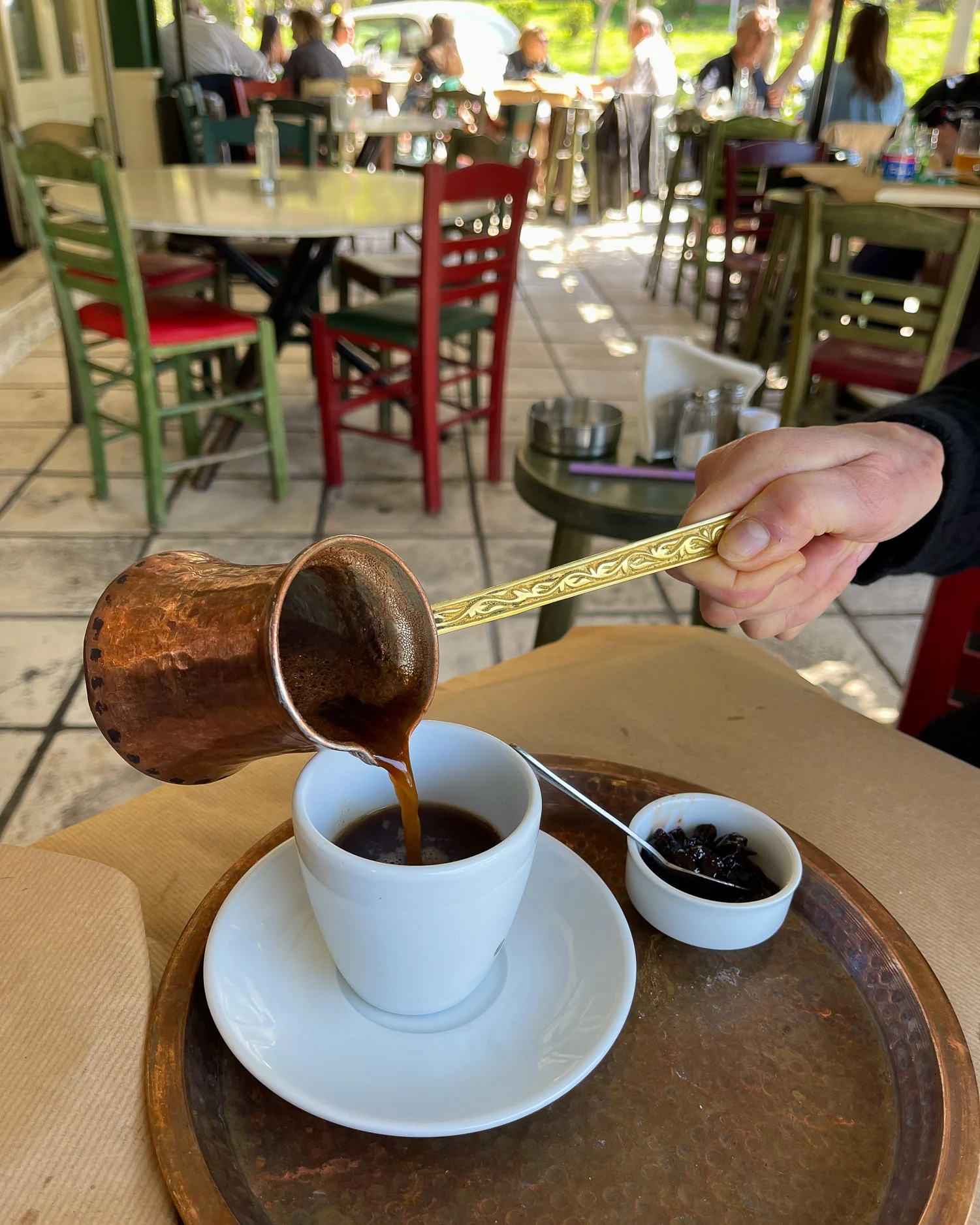
Best places for brunch in Thessaloniki
The international outlook and large student population of Thessaloniki have blessed the city with a thriving Brunch culture.
Along with your coffee and pastries, look out for brunch dishes based on local Greek flavours. The ubiquitous koulouri bagels may be filled with avocados or smoked salmon, while pancakes and waffles are drizzled with Greek yoghurt and honey.
For eggs you might try the Strapasada Greek scrambled eggs, cooked with chopped tomato and crumbled feta cheese. Or pick up a custard filled pastry Bougatsa or a slice of Tiropita cheese pie for a tasty morning snack.
Places that specialise in more substantial brunch dishes in Thessaloniki include Ergon Foods (P.Mela 42), Donkey Garden (Skra 3), Estrella (P. Mela 48) and Apallou (Mitropoleos & Karolou Ntil 10).
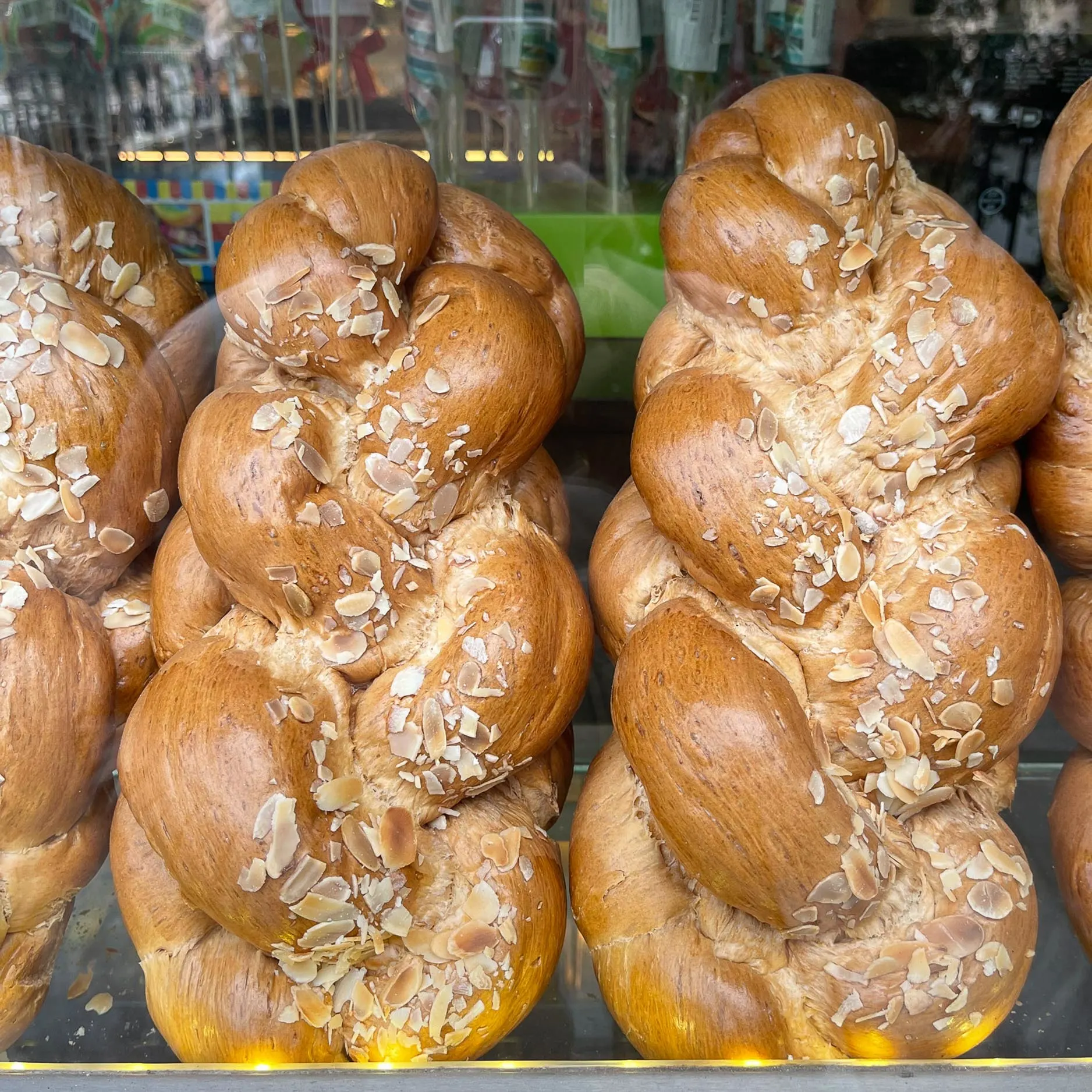
Bread, pastries and cakes in Thessaloniki
There are numerous elegant bakeries and cake shops in Thessaloniki, making it heaven if you have a sweet tooth like me.
The city is also known for certain special cakes such as the triangle shaped Trigona, custard filled Bougatsa and milk pudding Kazan Dipi.
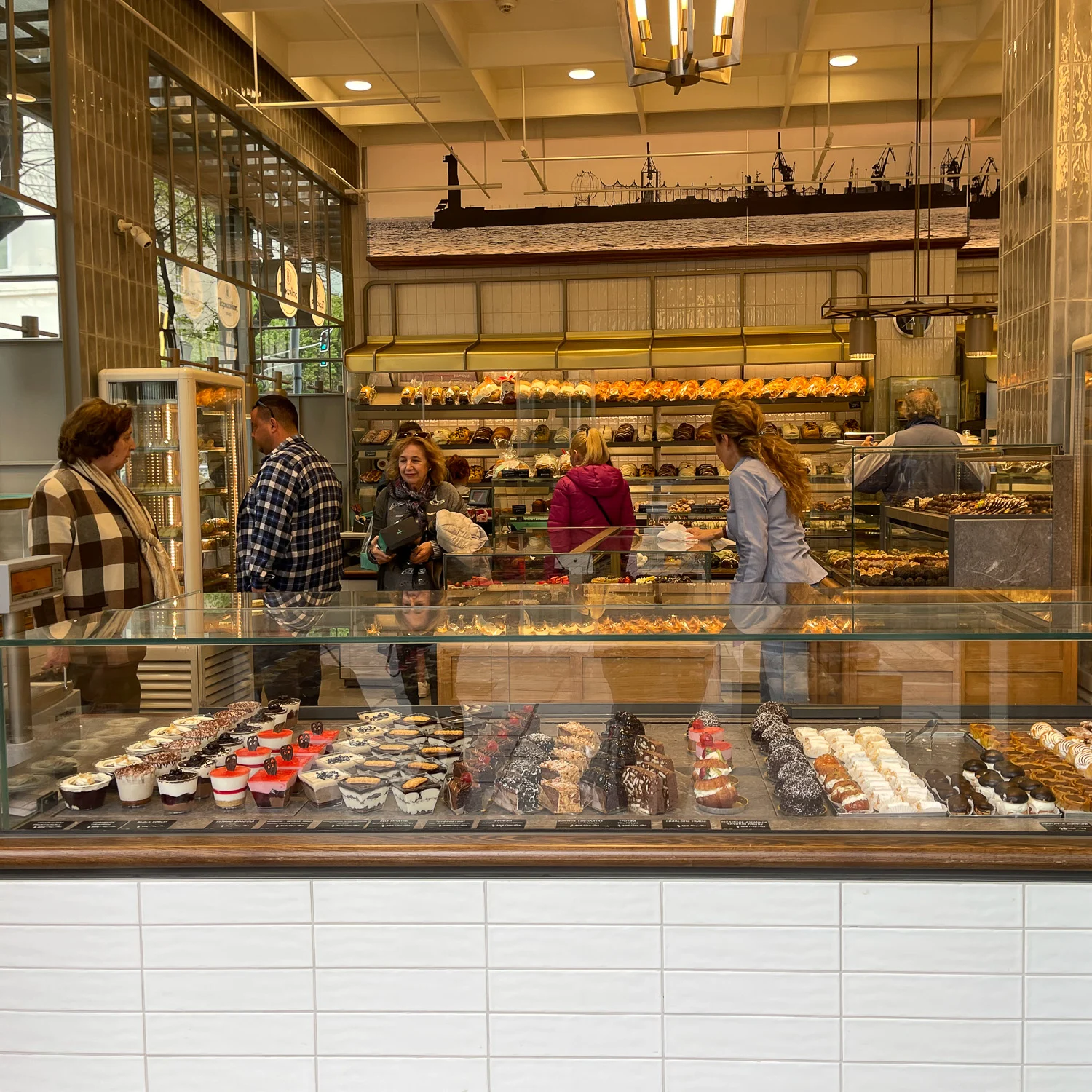
Trigona
Thessaloniki’s most famous Trigona pastry is unique to the city and originated at the Elenidis Patisserie in the Panorama neighbourhood to the north of Thessaloniki. There’s a more accessible city centre branch of the Elenidis patisserie (Dim. Gounari 13) close to the White Tower.
Trigona are made by folding filo pastry into a triangle shape, which is baked and then hollowed out. The syrup soaked pastry is filled when cool with a creamy custard.
You will find the Trigona at many other pastry shops throughout Thessaloniki but they are less common elsewhere in Greece.
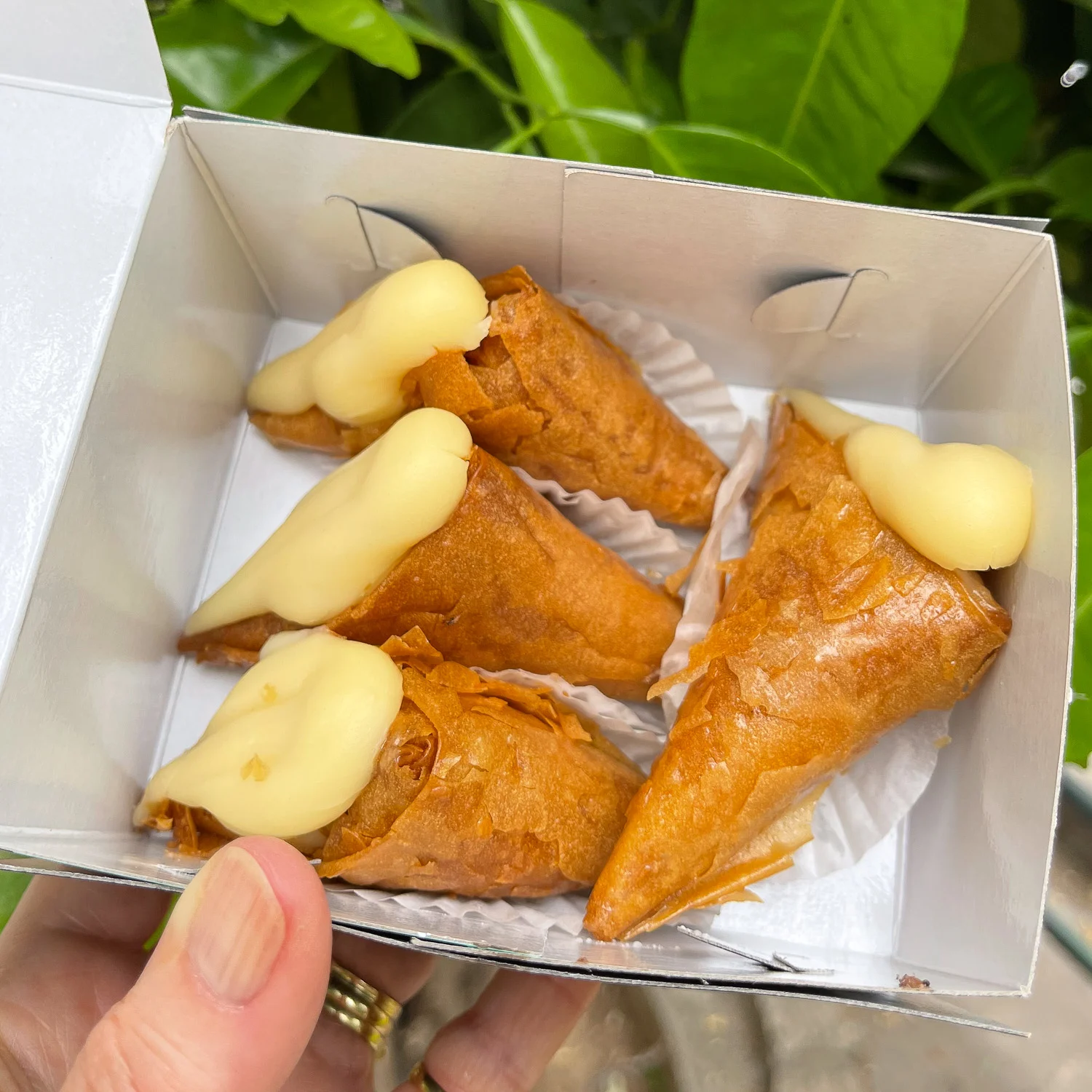
Bougatsa in Thessaloniki
Bougatsa is a pastry that originated in Thessaloniki, but has now become popular all over Greece. It’s made of filo pastry with a sandwich layer of creamy custard, baked in the oven and traditionally eaten as a breakfast pastry, sprinkled with icing sugar and cinnamon.
You’ll find Bougatsa in many bakeries but there are few specialising in it that are worth seeking out. One of the most central is Serraikon (Vasileos Irakleiou 35) close to the Modiano market. They make several different kinds of Bougatsa including a savoury one with spinach or soft cheese, and one that has no filling at all.
Other well known Bougatsa bakeries in Thessaloniki include Bougatsa Giannis (Mitropoleos 106) near the White Tower and Bougatsa Bantis (Panagias Faneromenis 33) which is in a less central residential area. The trendy brunch spot Estrella (P. Mela 48) has created their own homage to the Bougatsa in a custard filled croissant, which they call Bougatsan.
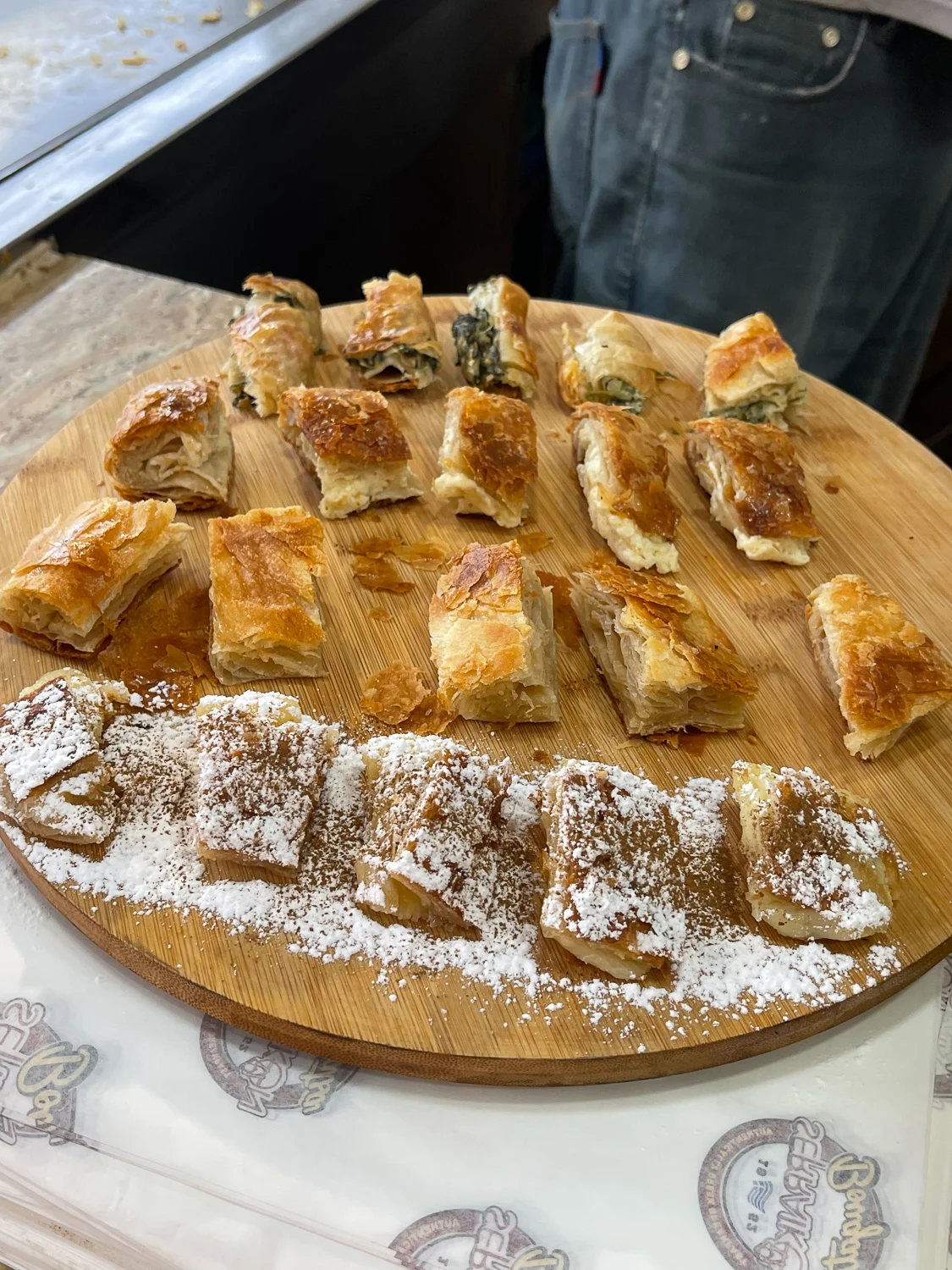
Kazan Dipi in Thessaloniki
Kazan Dipi is a milk style pudding that’s served as a traditional desert in the tavernas of Thessaloniki or to take home from the patisserie. The name comes from the Turkish word for ‘bottom of the pan’ and the creamy custard has a caramelised surface a bit like creme brûlée.
This rosewater flavoured desert was brought to Thessaloniki by immigrants from Asia Minor. It is said to have originated in the kitchens of a Sultan, whose chef did not want to admit he had burned the custard at the bottom of the pan.
In Thessaloniki you can find Kazan Dipi at the Konstantinidis Patisserie (P. Mela 12) which has a wide range of traditional deserts and pastries.
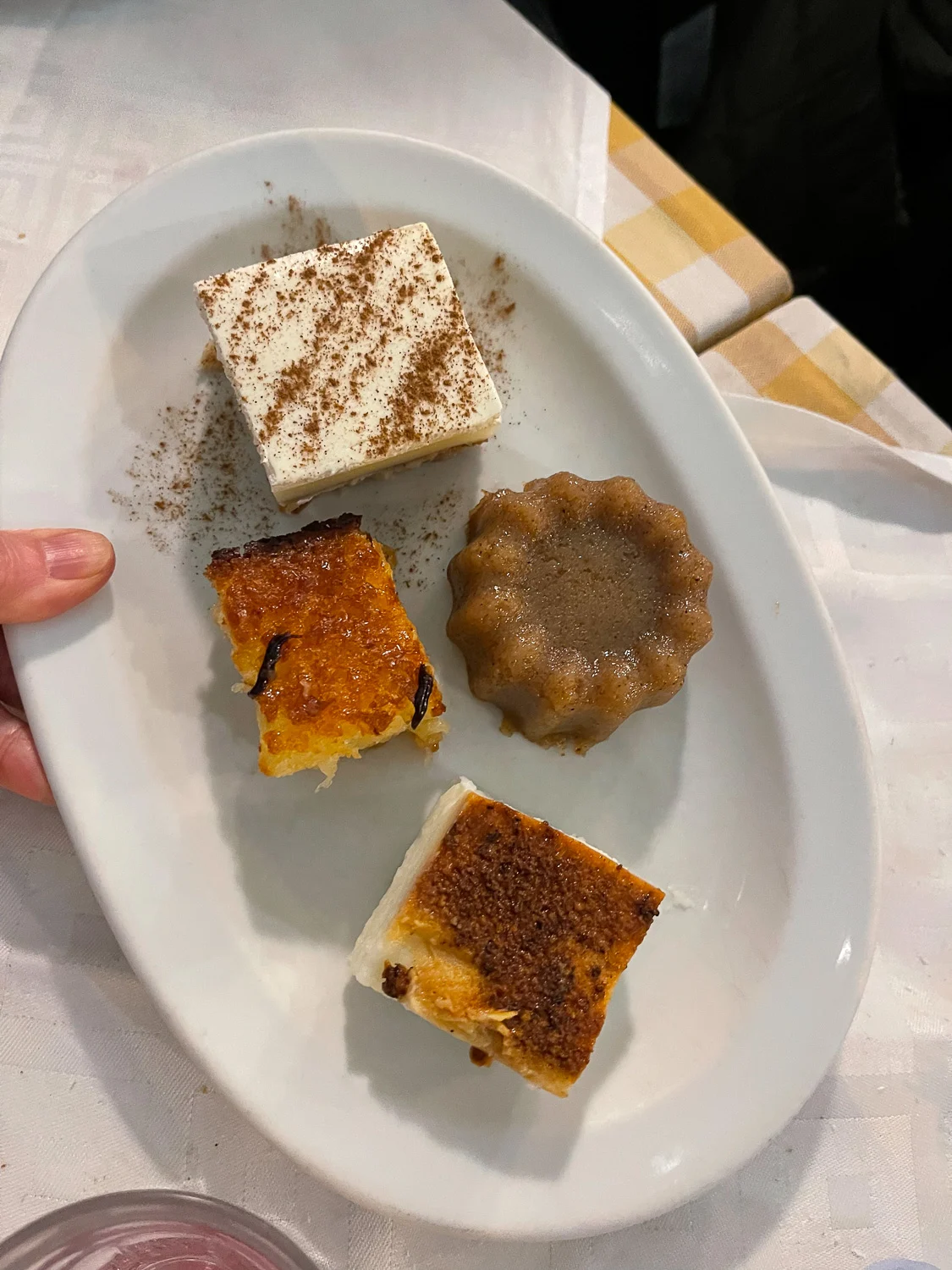
If you enjoy food and want to understand the diverse food culture of Thessaloniki, we highly recommend taking this Culinary walking tour for food lovers which we enjoyed, ending with a traditional lunch at one of the market cafes.
Tsoureki in Thessaloniki
Tsoureki is a sweet plaited brioche bread that’s especially popular in Thessaloniki around Easter time, traditionally eaten on Easter Sunday. It has been popularised as a year round treat by Terkenlis Patisserie who make it with different fillings and icings, such as chocolate or chestnut cream. Terkenlis have several branches around the city and their flagship store is on Aristotelous Square.
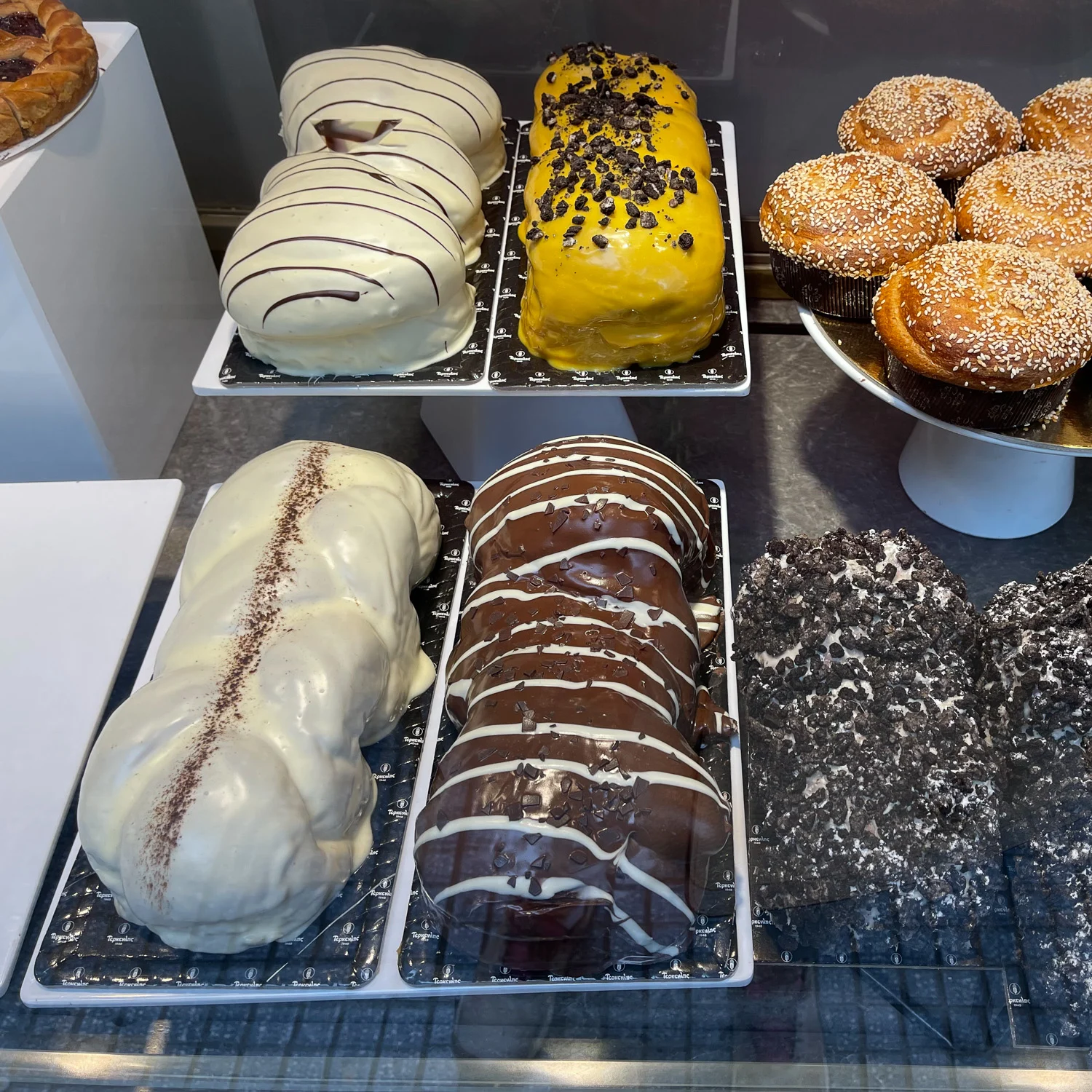
Loukoumi in Thessaloniki
Loukoumi is the Greek version of Turkish delight and is offered in Greece as a sweet with coffee. It’s made of sugar syrup boiled with starch and fruit or rosewater flavourings, sometimes rolled in nuts or other toppings. If you want to try it in Thessaloniki, head to Modiano market where there’s a stall called Nuts Factory which has a huge and colourful range of Loukoumi.
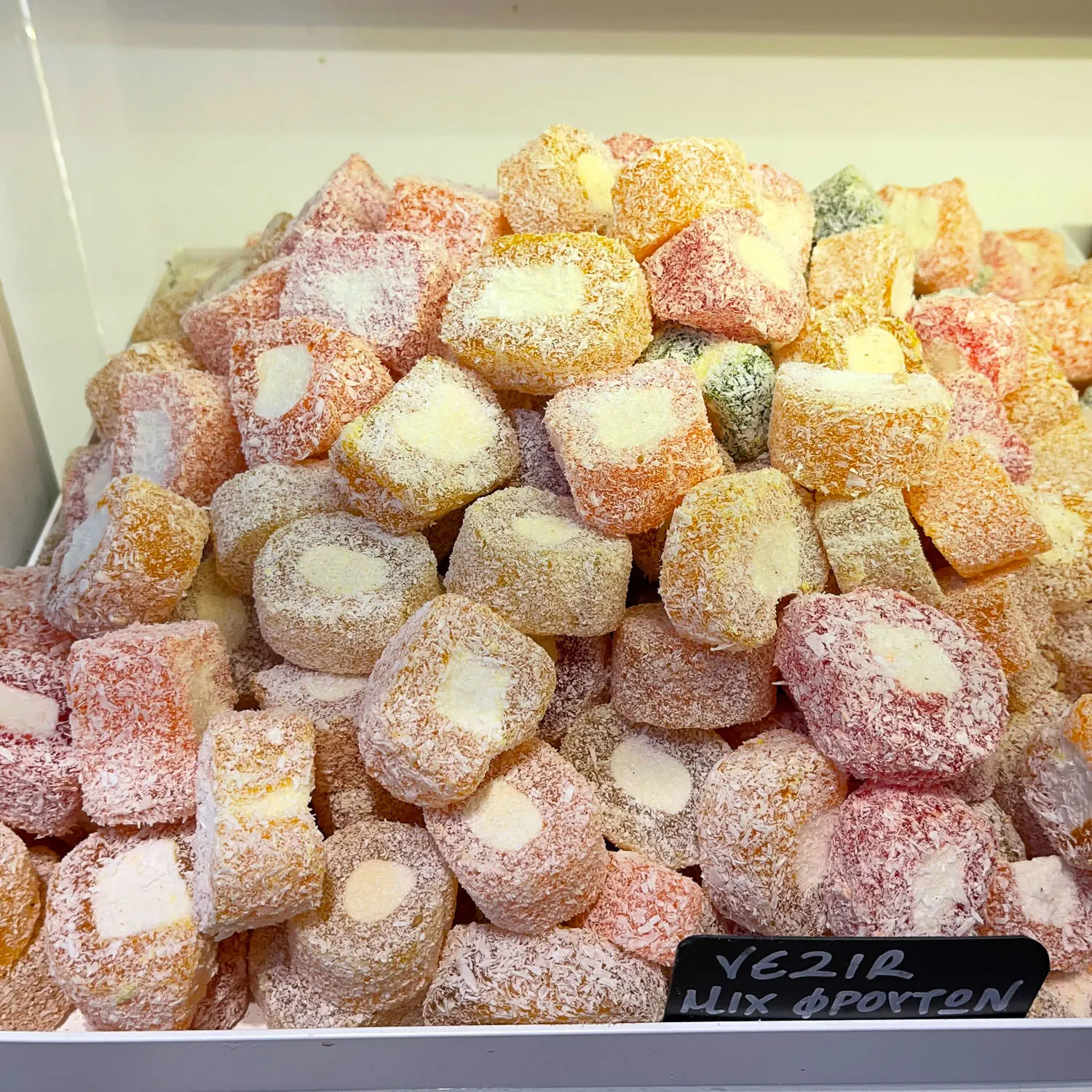
For more on things to do, where to stay and how to plan your trip, read my article on the best things to do in Thessaloniki Greece
Bread and bakery in Thessaloniki
Koulouri
These ring shaped bagels covered in sesame seeds are a firm favourite everywhere in Greece, bought as a snack to eat on the street. In Thessaloniki most bakers offer variations of Koulouri, with seeds, nuts or flavourings such as olives and raisins worked into the dough. The larger ones can also be sliced and filled like a sandwich with feta, ham or cream cheese for lunch.
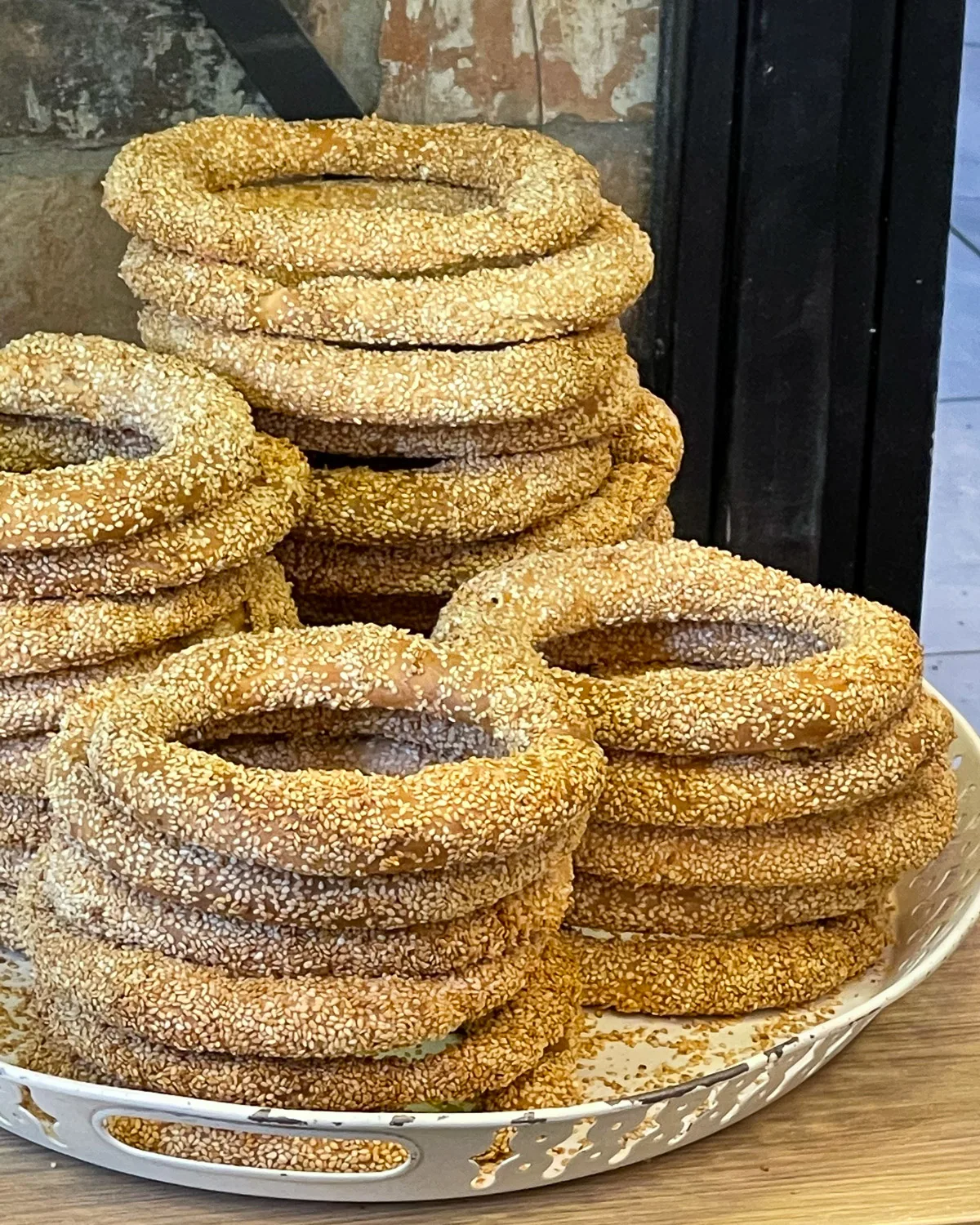
Spanakopita and Tiropita
For an inexpensive street food in Thessaloniki, pick up a ‘pita’ or pie from any local bakery, which will normally be served warm as a square slice from a bigger tray. The most popular variations are tiropita (cheese pie) made with soft feta cheese or spanakopita (spinach pie).
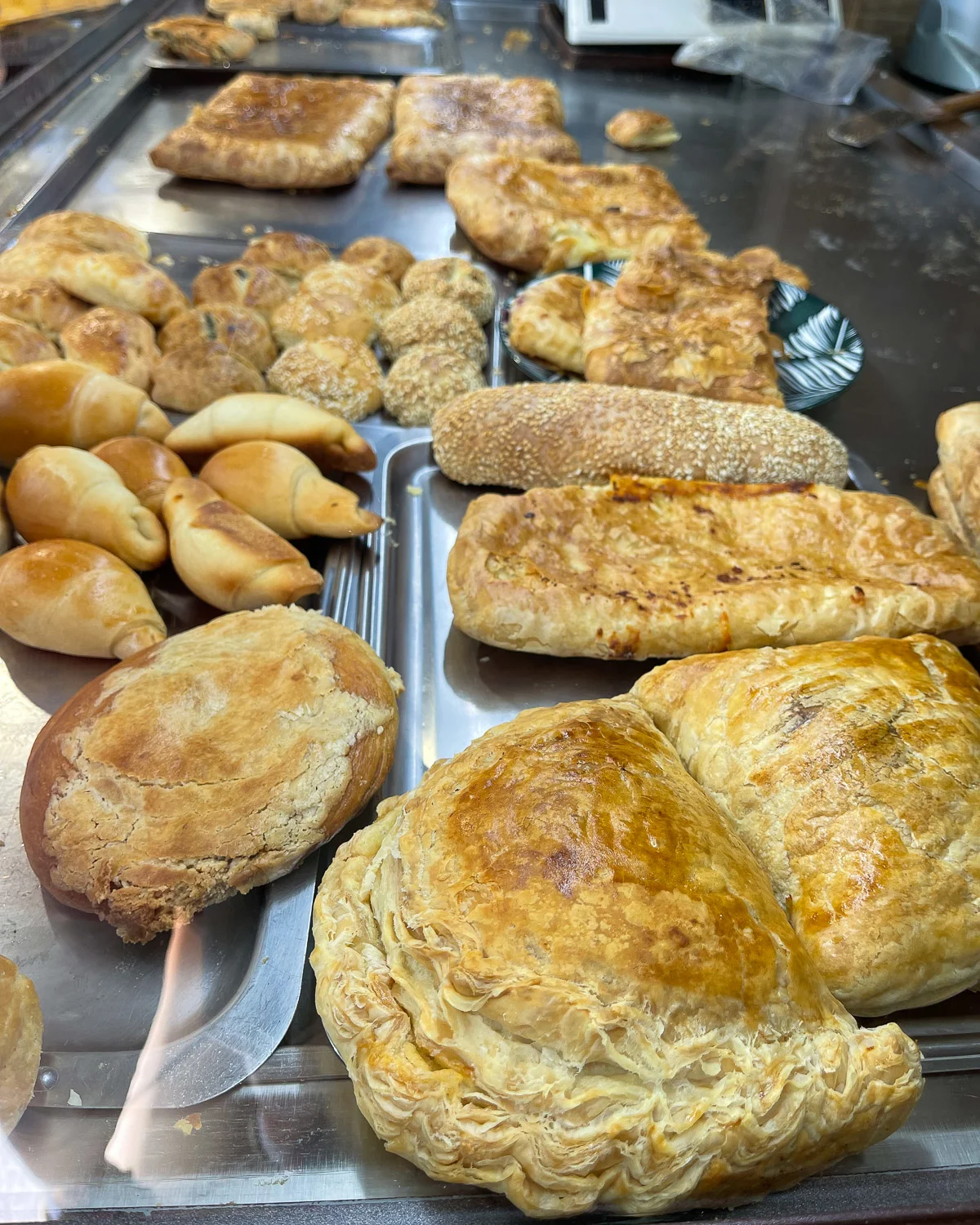
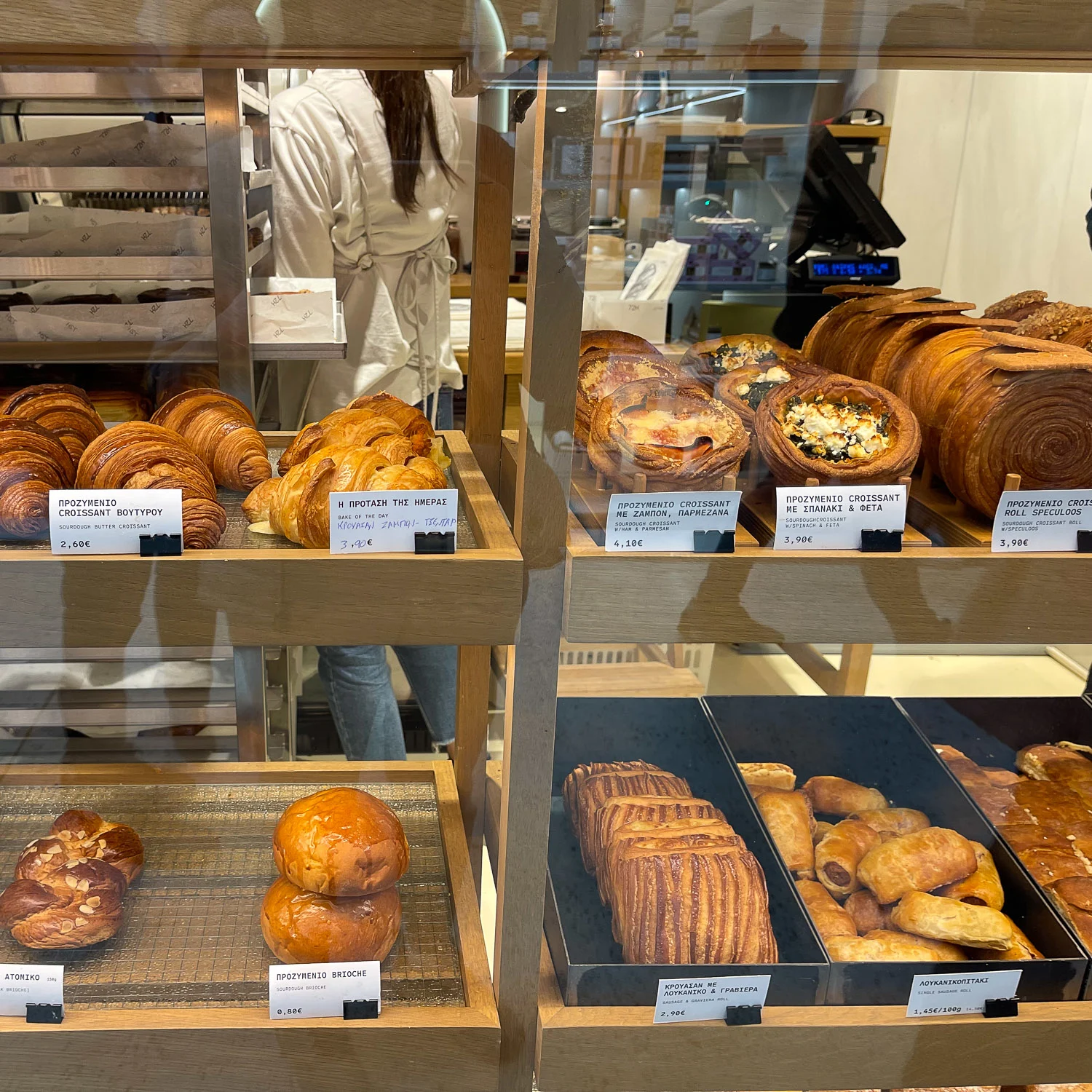
Food tours in Thessaloniki
Culinary walking tour of Thessaloniki – This 3 hour tour takes you around the markets and specialty food shops with multiple tastings and a lunch in one of the traditional tavernas. *Tried and tested by us!*
Walking open market food tour and tasting – This 2 hour walking tour takes you to the open air markets of Thessaloniki to try a Greek coffee and sample some of the traditional foods and produce.
Thessaloniki Bike tour -this 3 hour tour takes you cycling around some of the city highlights.

Stay at The Excelsior – a small luxury hotel in a neoclassical building with a central location
Markets in Thessaloniki
The region around Thessaloniki is one of the most fertile areas of Greece for fresh produce, which is brought in from Macedonia and the neighbouring regions of Thrace and Thessaly. A great way to experience the sheer variety of food in Thessaloniki is to wander through one of the city’s markets.
Kapani Market Thessaloniki
Kapani is Thessoliniki’s main market, its name coming for the Turkish word for flour. This covered market is also known locally as the “Turkish Market” to differentiate it from other markets nearby such as the “Greek market” and “Jewish Market”.
Located in the heart of Thessaloniki’s lower town, you’ll find fresh produce, fish, meat, deli counters and even a sections selling clothing. Kapani Market is one of the top places to visit in Thessaloniki for food lovers, enjoyed by locals and visitors alike.
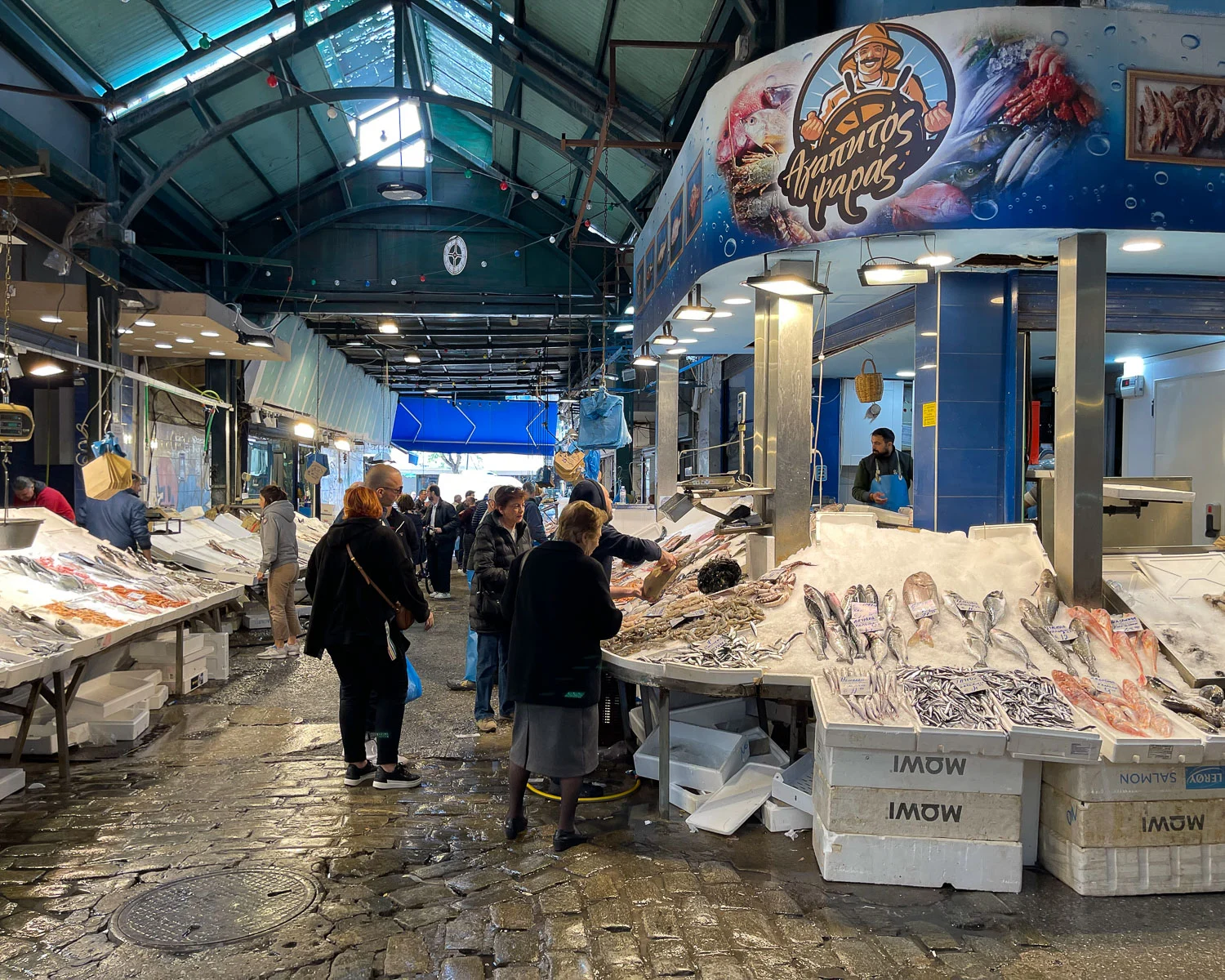
You can visit the market any day except Sunday when it’s closed. The meat and fish stalls are particularly atmospheric to walk through and these open early, winding down after lunch.
We recommend strolling through Kapani market to soak up the atmosphere, or visit on a food tour like the one we took with Let’s Meet in Thessaloniki.
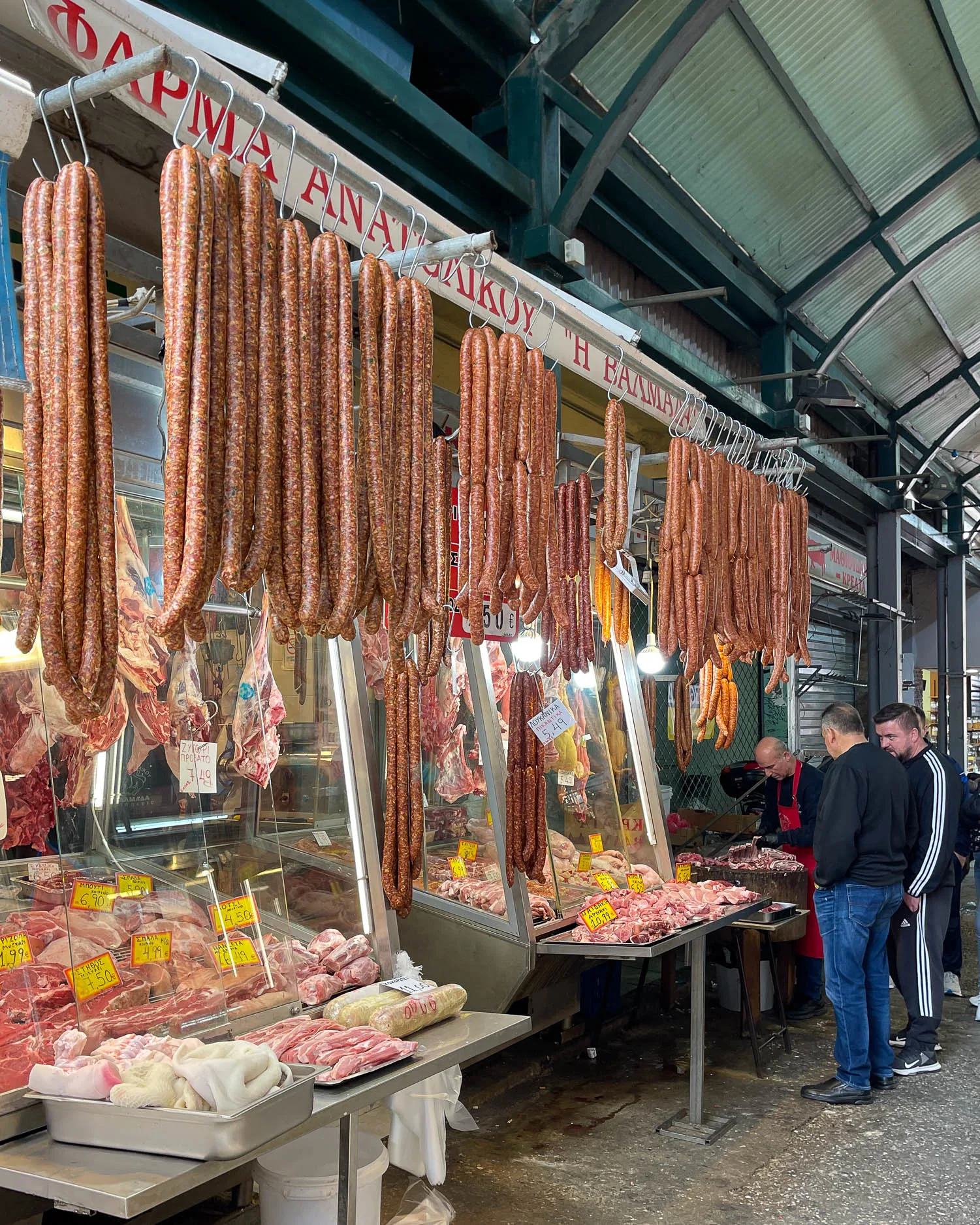
Vatikioti Market – Athonos Square
Across Aristotelous Square from the main entrance of Kapani Market is Vatikioti Market, which leads to Athonos Square. The specialty here is herbs, spices and deli counters selling local products, with some fruit and veg stalls.
In the lanes around the market are basket weavers and artisan shops, with numerous restaurants which are packed in the evening but mostly closed during the day.
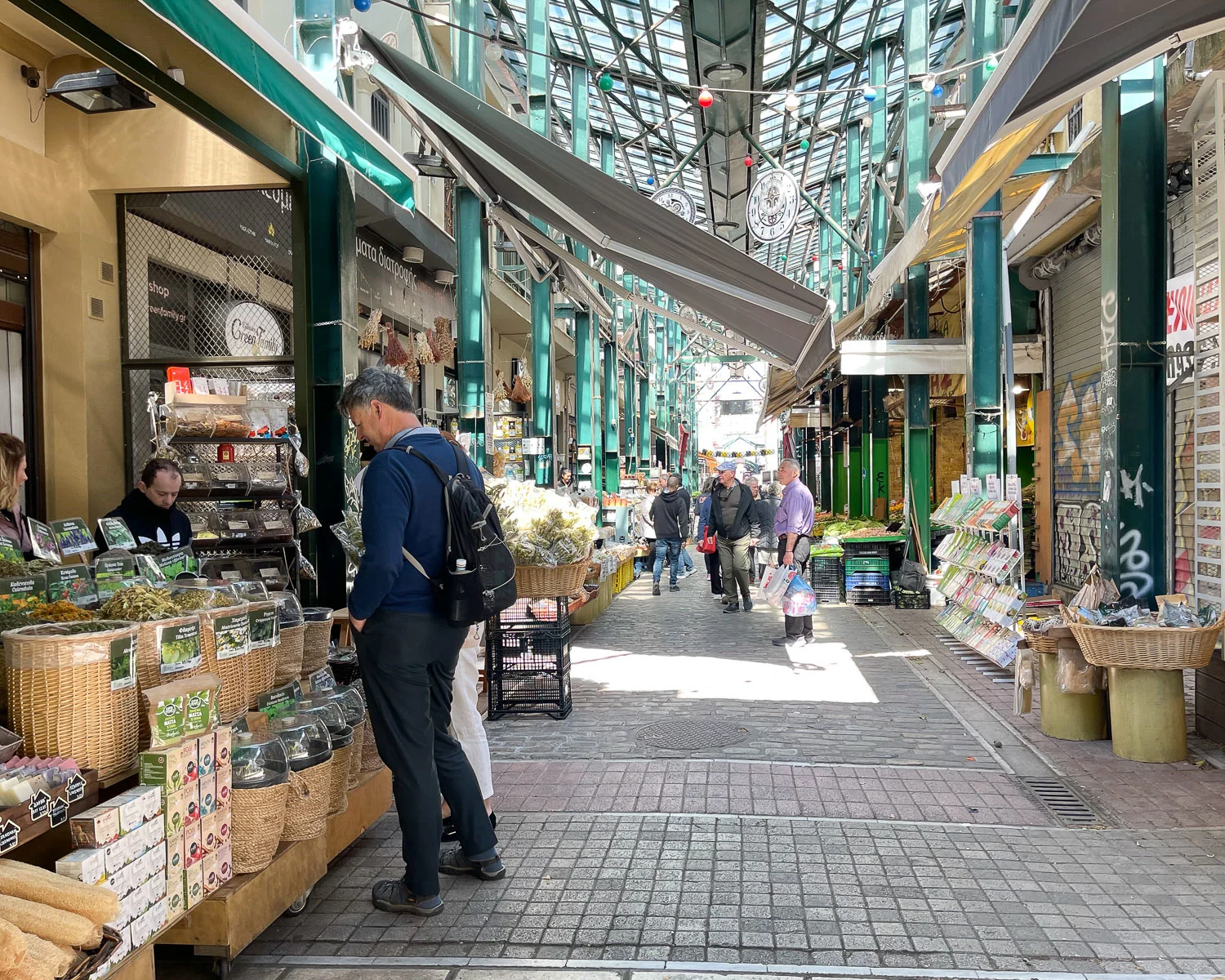
Modiano market Thessaloniki
Modiano Market was formerly a traditional market dating back to the 1920s, also known as the “Jewish Market”. But the elegant building has now been renovated and filled with food businesses of more modern style aimed at a high level of gastronomy.
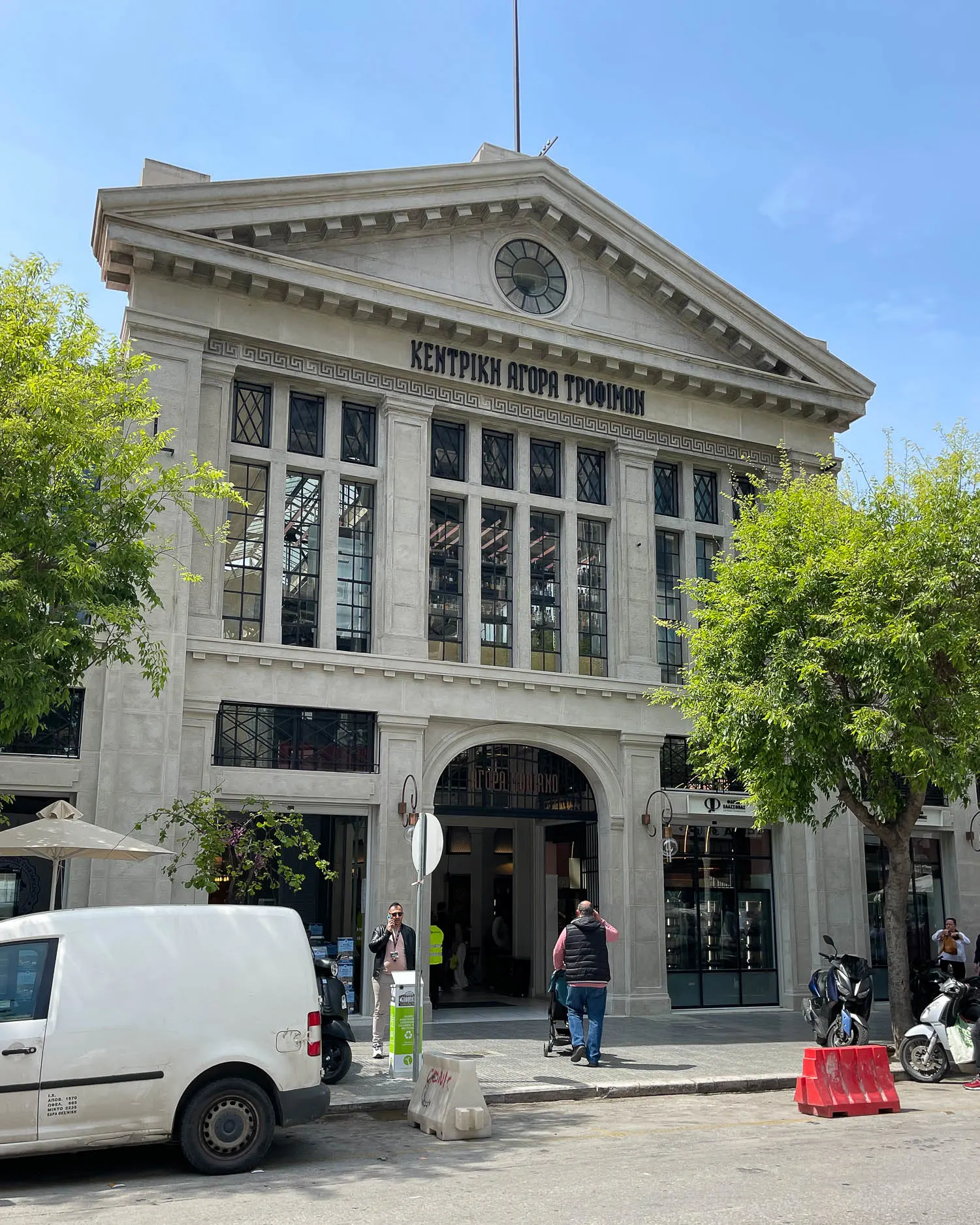
This is a place to browse, taste, buy gifts and soak up the latest foodie trends rather than to purchase the ingredients for your evening meal.
Some of the stalls sell street food and there’s a whole section of tables on the upper level where you can sit down and eat your purchases.
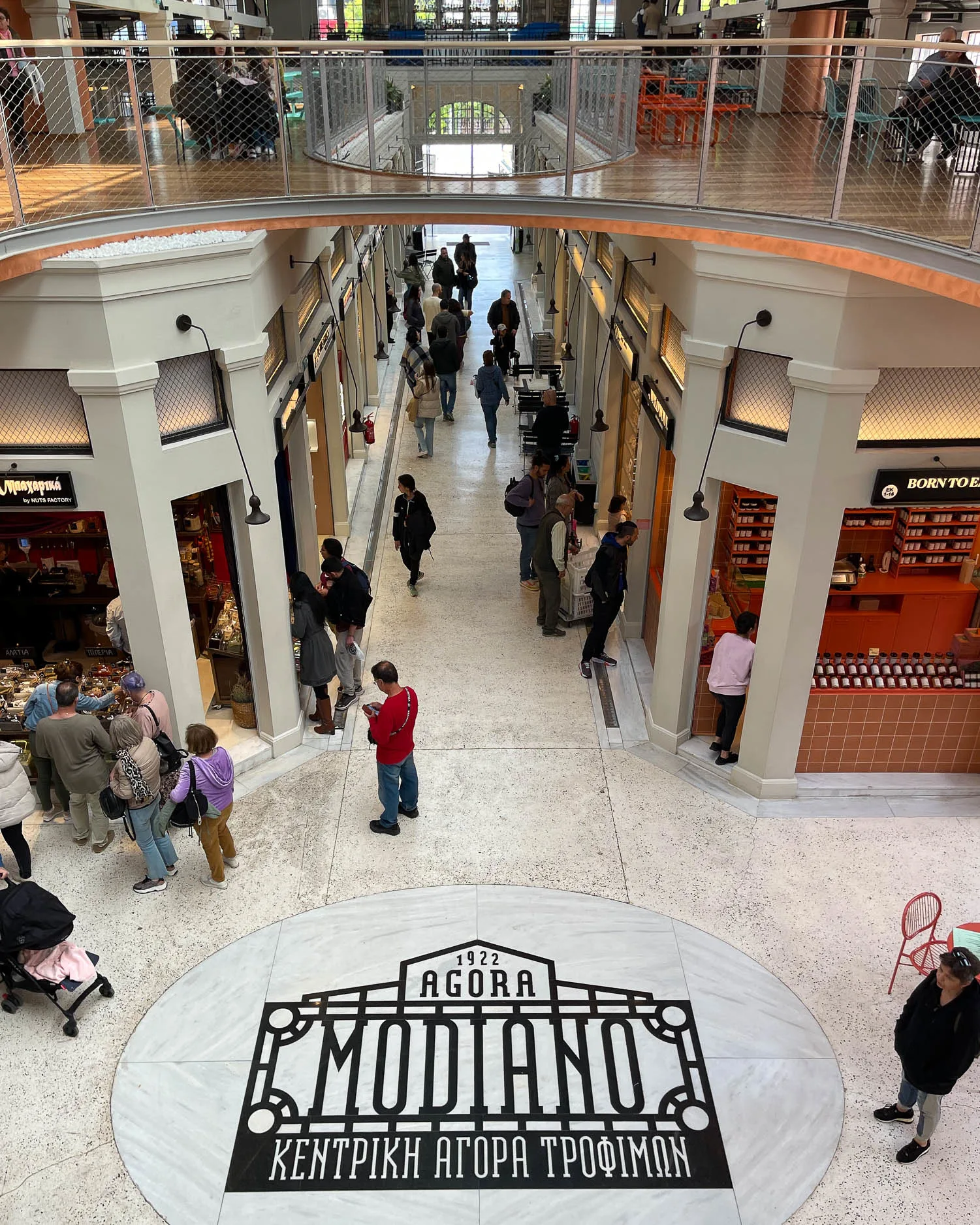
The two cafes on the upper floor of the market get busy in the evening and there are gastronomic events throughout the year.
I can recommend taking this food tour, where we visited Modiano Market and tried some excellent local cheese, colourful Loukoumi sweets and saw the finely ground Greek coffee being made.
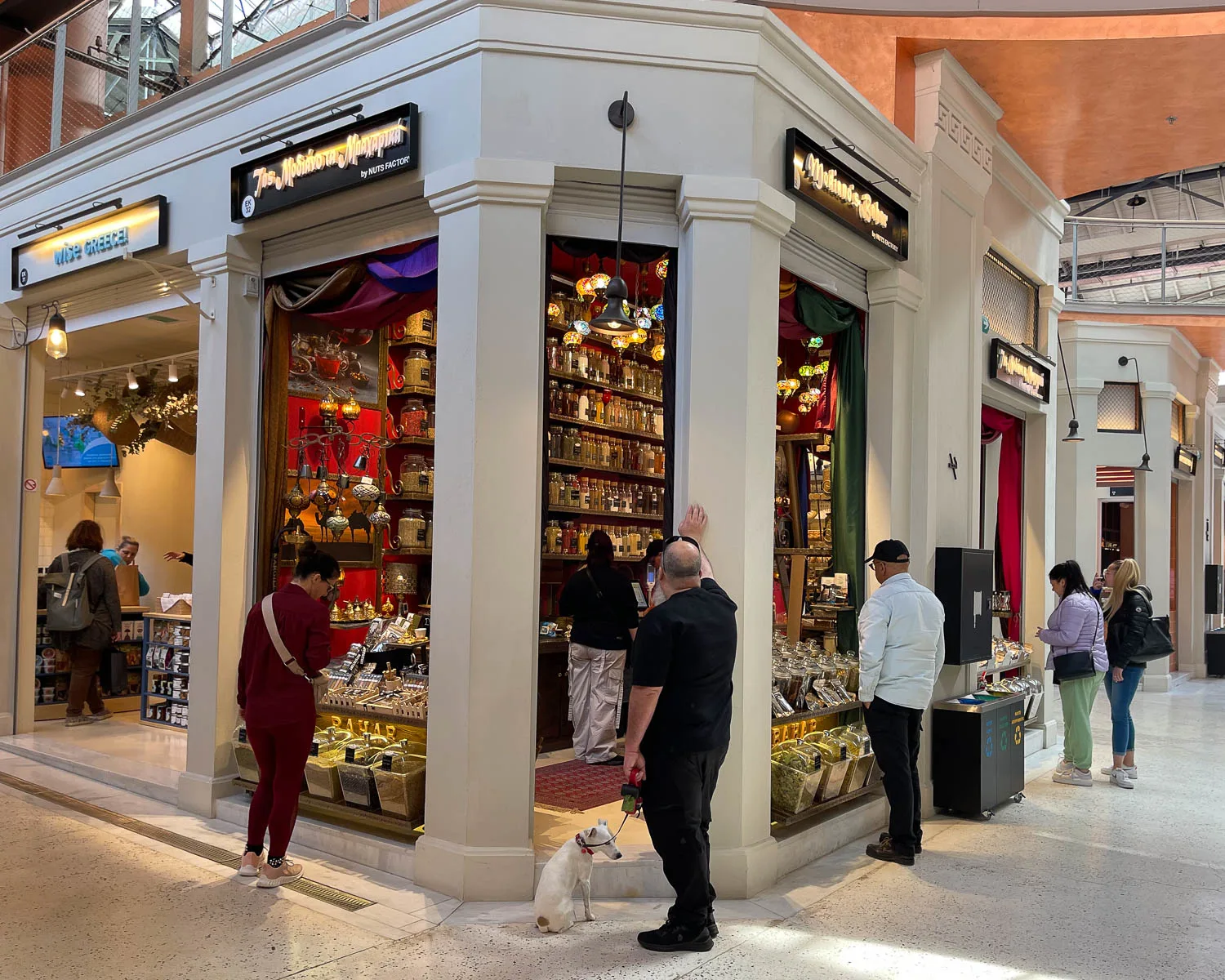
Louloudadkia Flower Market
Just across the street from the Modiano market is a charming square with the old Hammam, known as the Louloudadika market. Only 3 stalls remain here today of what was once a busy flower market, but they make a pretty picture. There are a few cafes around the square so it’s a pleasant place to take a coffee break.
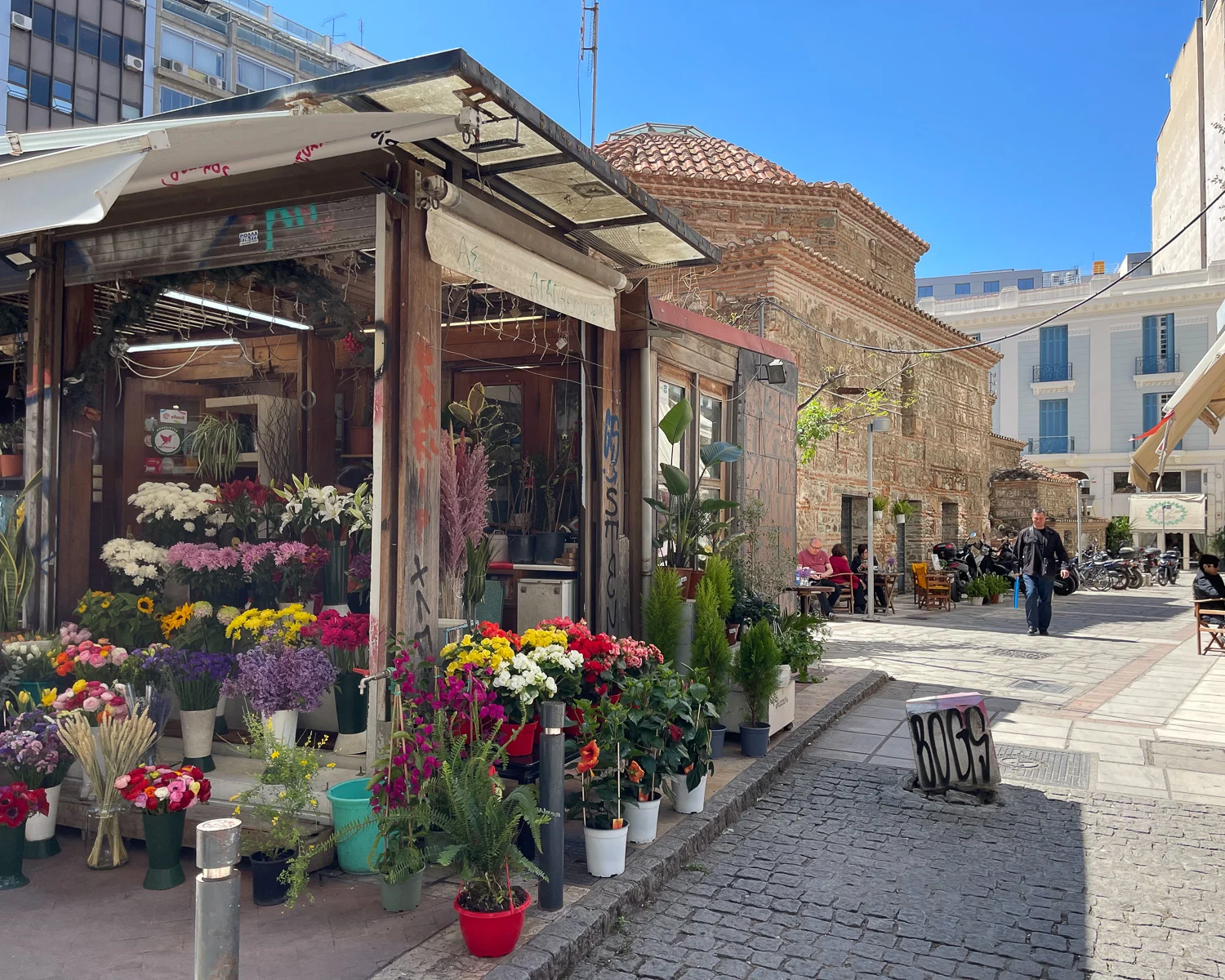
The Greek Market of Thessaloniki
Tucked away next door to Modiano Market is the “Greek Market”, which has a few stalls but seems quite run down in comparison. It’s chiefly known for the covered passage of restaurants – you can find it by locating Serraikon which is on the entrance corner and has a reputation for the best bougatsa in Thessaloniki.
We walked through the passage that runs from Vasilios Irakleiou to Ermou and found a number of interesting restaurants serving fresh fish and home cooked dishes based on market produce.
The Greek market is where we ended our Culinary walking tour for food lovers with a traditional lunch at one of the market cafes.
For more on things to do, where to stay and how to plan your trip, read my article on the best things to do in Thessaloniki Greece

The Caravan is a colourful and stylish small hotel with vintage touches close to the Roman Forum
What food is Thessaloniki known for?
Many of the fruit and vegetables you’ll see in the markets are unique to the region and have a Protective Designation of Origin (P.D.O) Look out for the following local specialties in the markets and on restaurant menus.
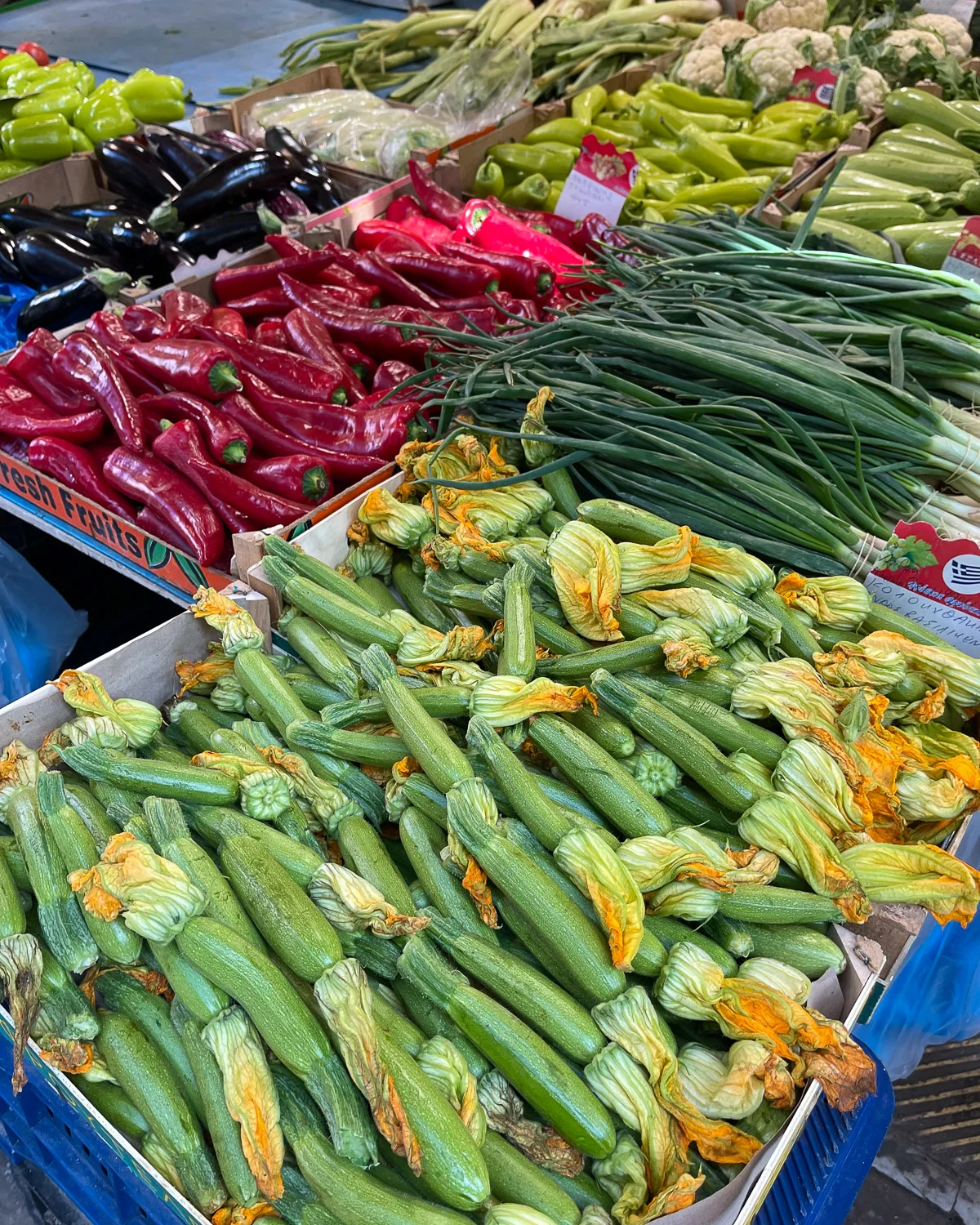
Local fruit and vegetables in Thessaloniki
Peaches from Naousa – This town to the west of Thessaloniki has mild winters and warm summers, which are perfect to grow peaches, in season from May to September.
Kiwi fruit from Pierias – The fruit is grown near Thessaloniki on the plains between Mt Pierus and Mt Olympus, giving it the name “the fruit of Olympus”. Kiwis are harvested in October and November but are often available until May.
Cherries from Rodochori – Cherries are traditionally grown around the village of Rodochori in the Kozani region of northern Greece. They are harvested in early summer when you should find them in the markets of Thessaloniki.
Florina peppers – these horn shaped red peppers come from the area of Florina in western Macedonia. They are harvested throughout the summer and are often cooked in the oven stuffed with cheese.
Giant beans from Kato Nerokopi – the Fasiola gigantes elefantes are grown on the northern border of Greece’s Macedonia region and are typically slow cooked in a tomato sauce and served as a side dish.
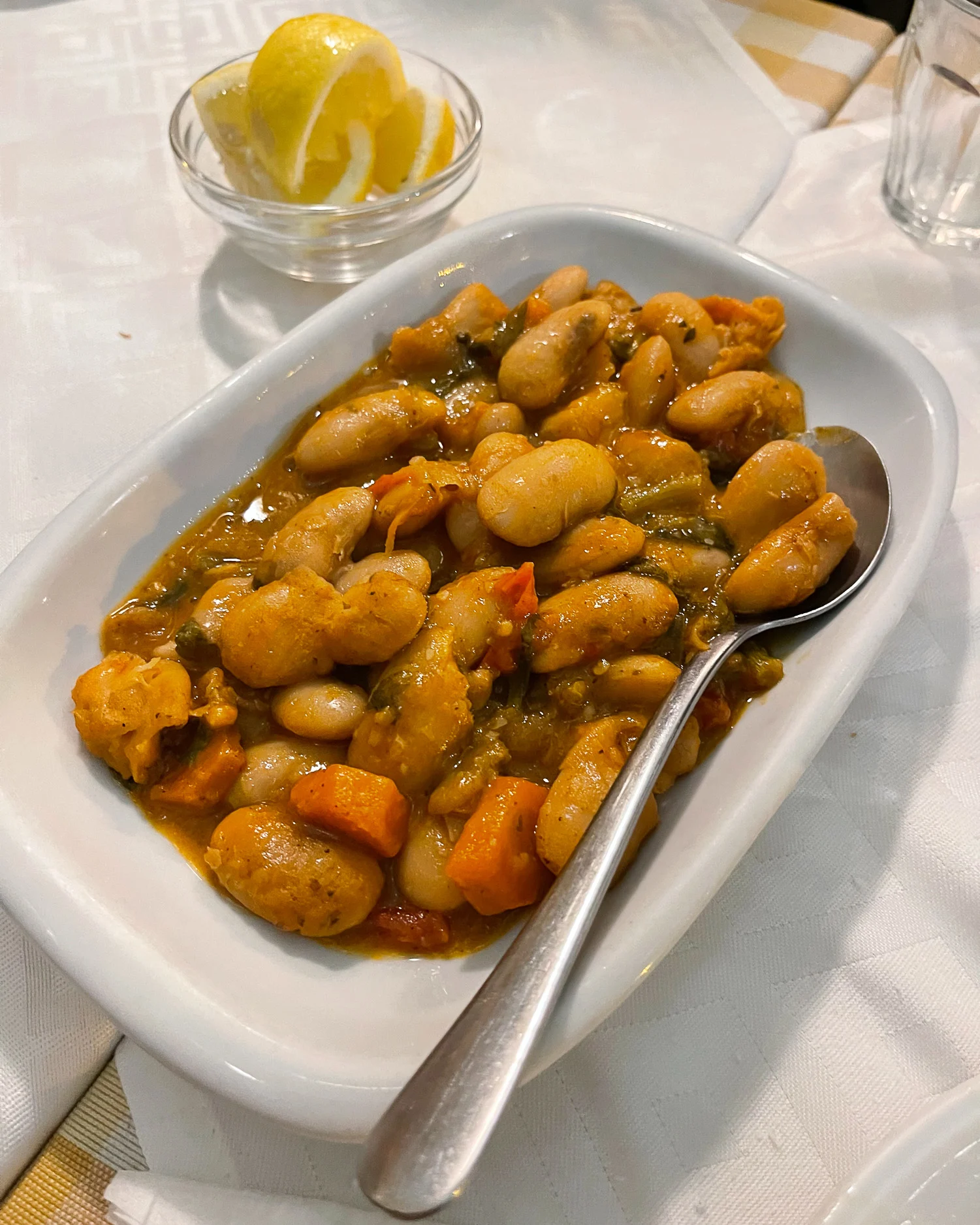
Halkidiki olives
Halkidiki olives – from the region south of Thessaloniki which is popular with holidaymakers in summer. The Prasines Elies Chalkidiki olives grow exclusively in this region and are so large they are also known as “donkey olives”. These green olives are known for their firm flesh and slightly bitter, spicy taste.
Halkidiki olive oil – Also look out for the cold pressed virgin olive oils of the region such as Galano Metaggitsiou Chalkidikis and early harvested Agoureleo Chalkidikis.
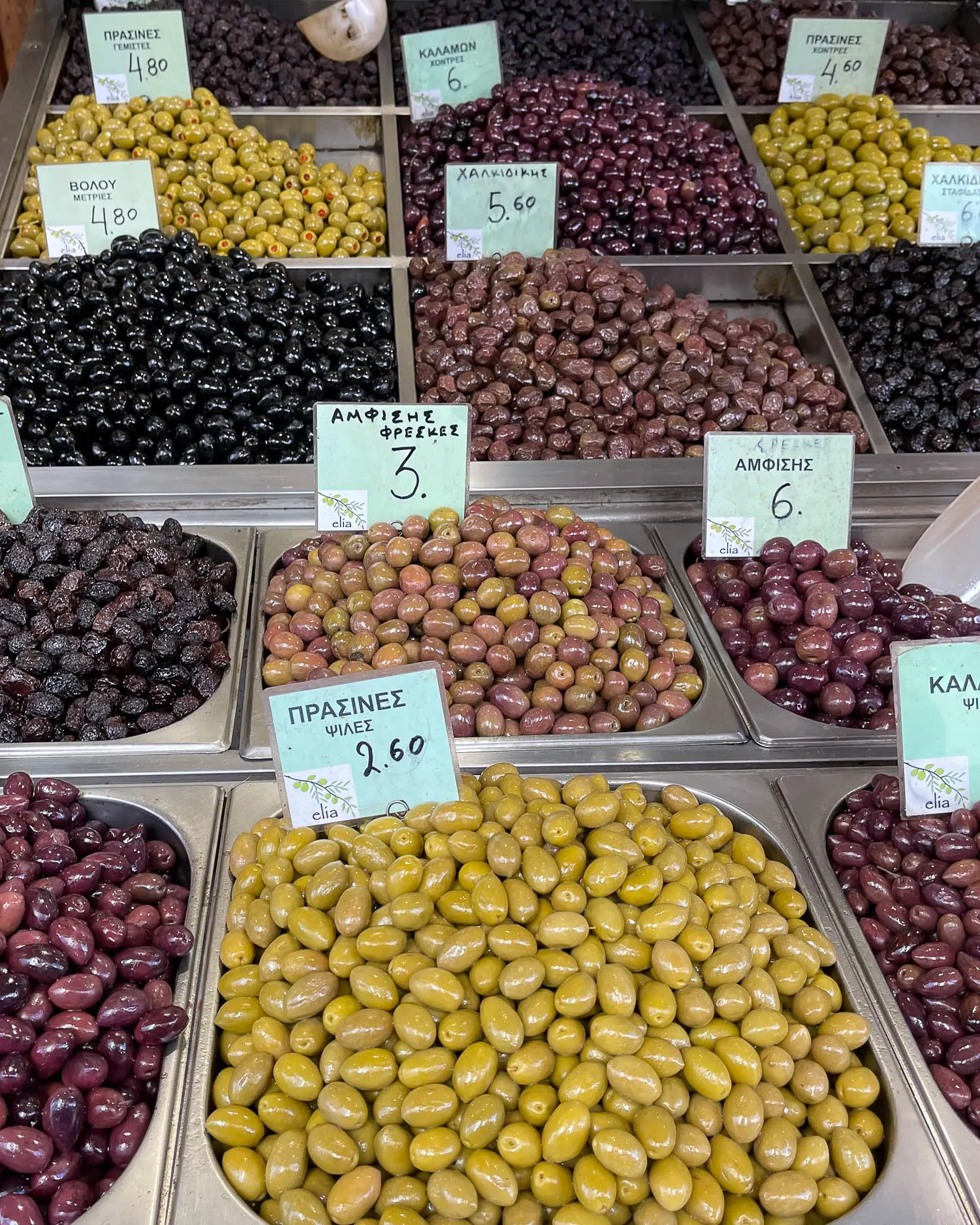
Cheese in Thessaloniki
While browsing the delicatessen counters, look out for the following cheeses in Thessaloniki.
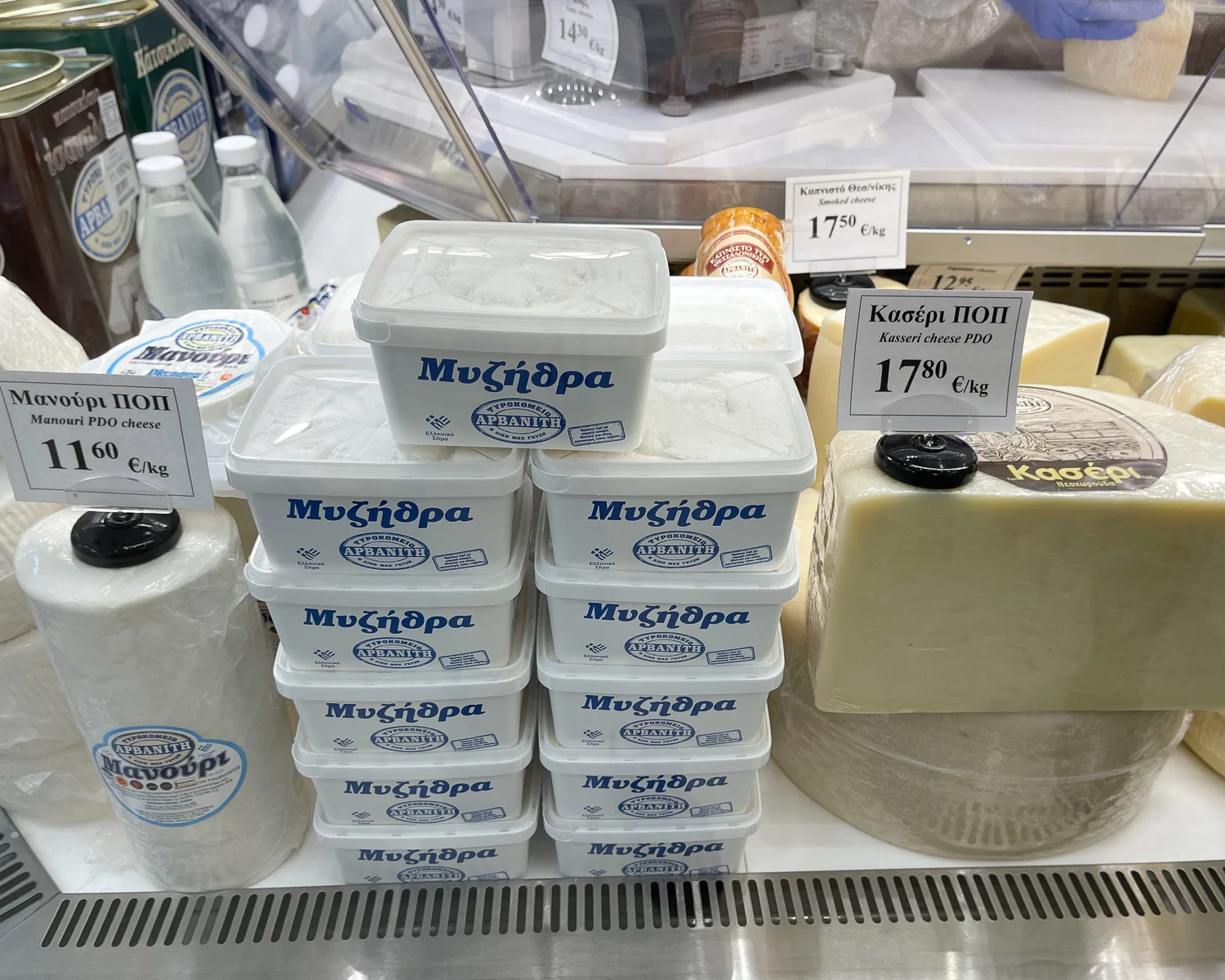
Anevato – a soft, grainy cheese from Macedonia that’s bit like cottage cheese and eaten with a spoon. Goat’s milk was traditionally mixed with rennet and left overnight for the curd to rise to the top, literally “the cheese that rises”.
Katiki Domokou – made with rennet in a similar way to Anevato, but this soft cheese is made exclusively from the milk of sheep or goats from the Orthis plateau in the region of Domokos, Thessaly. It’s often eaten as a dip with bread or fruit.
Feta cheese – while the salty feta cheese is found all over Greece, in Thessaloniki you can find the Doric Feta that’s a specialty of Macedonia. This is a cream cheese that’s used as a spread, often eaten at breakfast time.
Manouri – a semi-soft cheese from Thessaly and Macedonia that’s a bit like feta in consistency but creamier and less salty. It’s normally made with a mix of cow and sheep’s milk and is ideal to crumble over a salad.
Kyano – a firm but creamy blue cheese a bit like Roquefort that’s made from goat’s milk.
Kasseri – a semi-hard cheese made in Macedonia that is ideal for melting over food, in a similar way to Mozzarella. The name comes from the Jewish word Kosher, since it was originally made without rennet, making the cheese suitable for the large Jewish population of Thessaloniki.
Batzos – a semi-hard rindless cheese a bit like Feta that has a Protected Designation of Origin. It was originally made by goatherds in the mountains of northern Greece and is ideal for making saganaki, a shallow fried cheese.
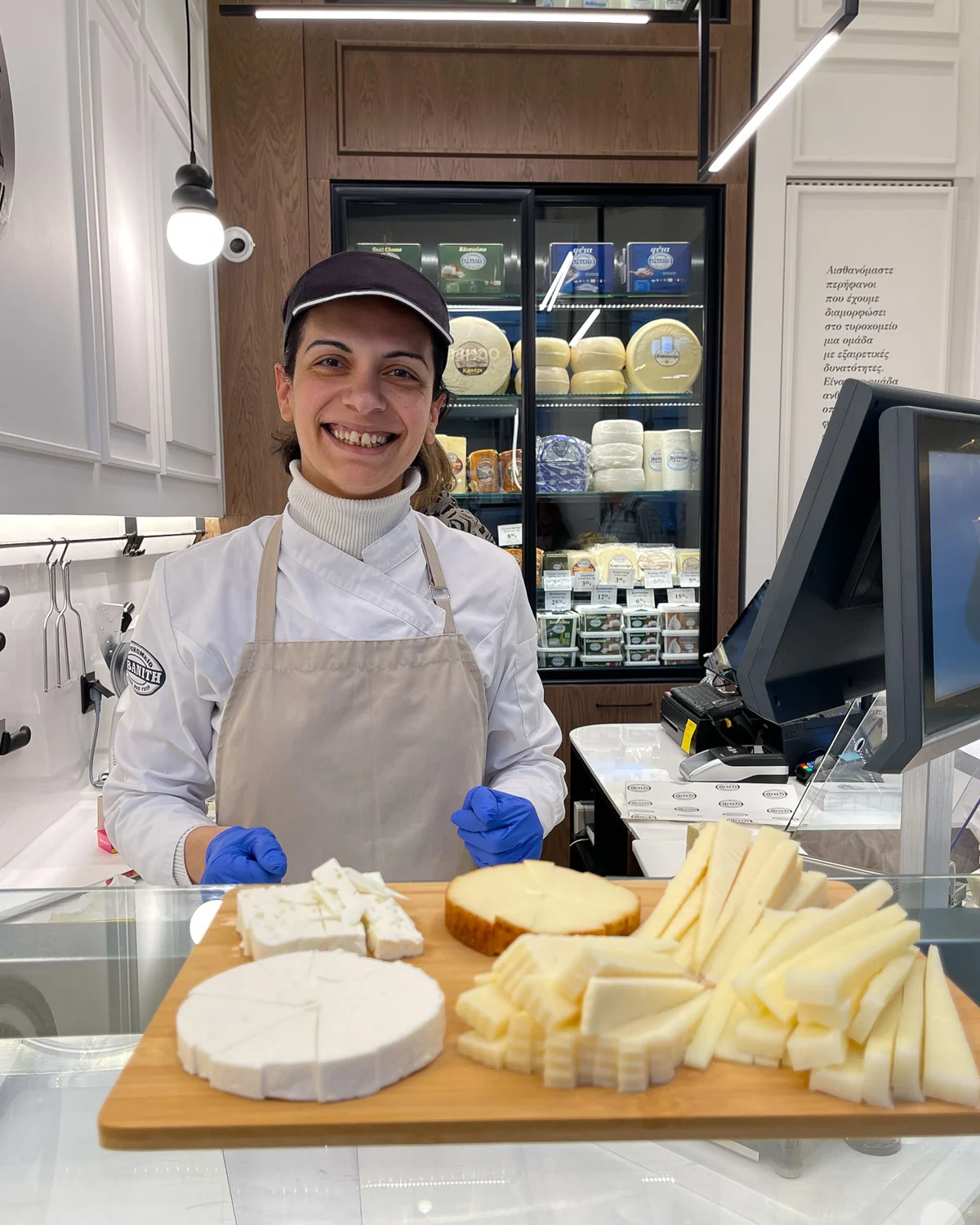
Where to try cheese in Thessaloniki
There’s an excellent cheese counter called Arvaniti Dairy in the Modiano market in Thessaloniki. We tried some local cheeses here as part of our food tour in Thessaloniki.
It you’d like to sit down and try some feta and other local cheeses, head to Mia Feta Bar (P. Mela 14) showcasing products from the Kourellas family dairy.
Food in Thessaloniki – typical dishes to try
While you’ll find all the favourite Greek dishes, the food of Thessaloniki is heavily influenced by Ottoman traditions and the influx of Greek refugees who arrived from Asia Minor.
Look out also for influences of Thessaloniki’s large Jewish population. The Sephardic Jewish cuisine of the Jews who migrated here from Spain and North Africa, is a specialty of Akadimia (Ag. Mina 3) near the Jewish Museum.
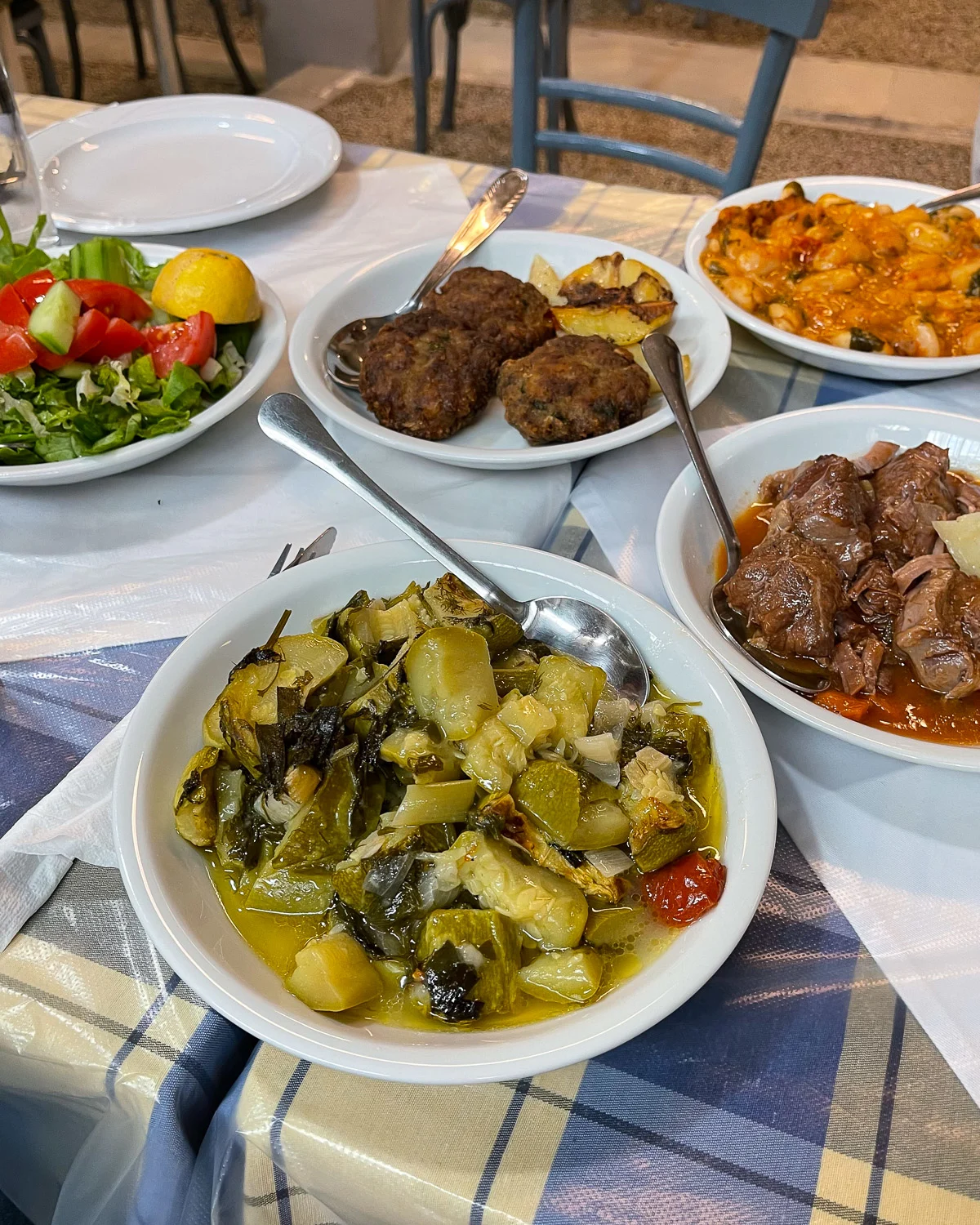
Politiki salad – this is a cabbage based salad a bit like coleslaw. The name means “of the city”, the city in question being Constantinople, with which Thessaloniki has strong ties dating back to Byzantine times.
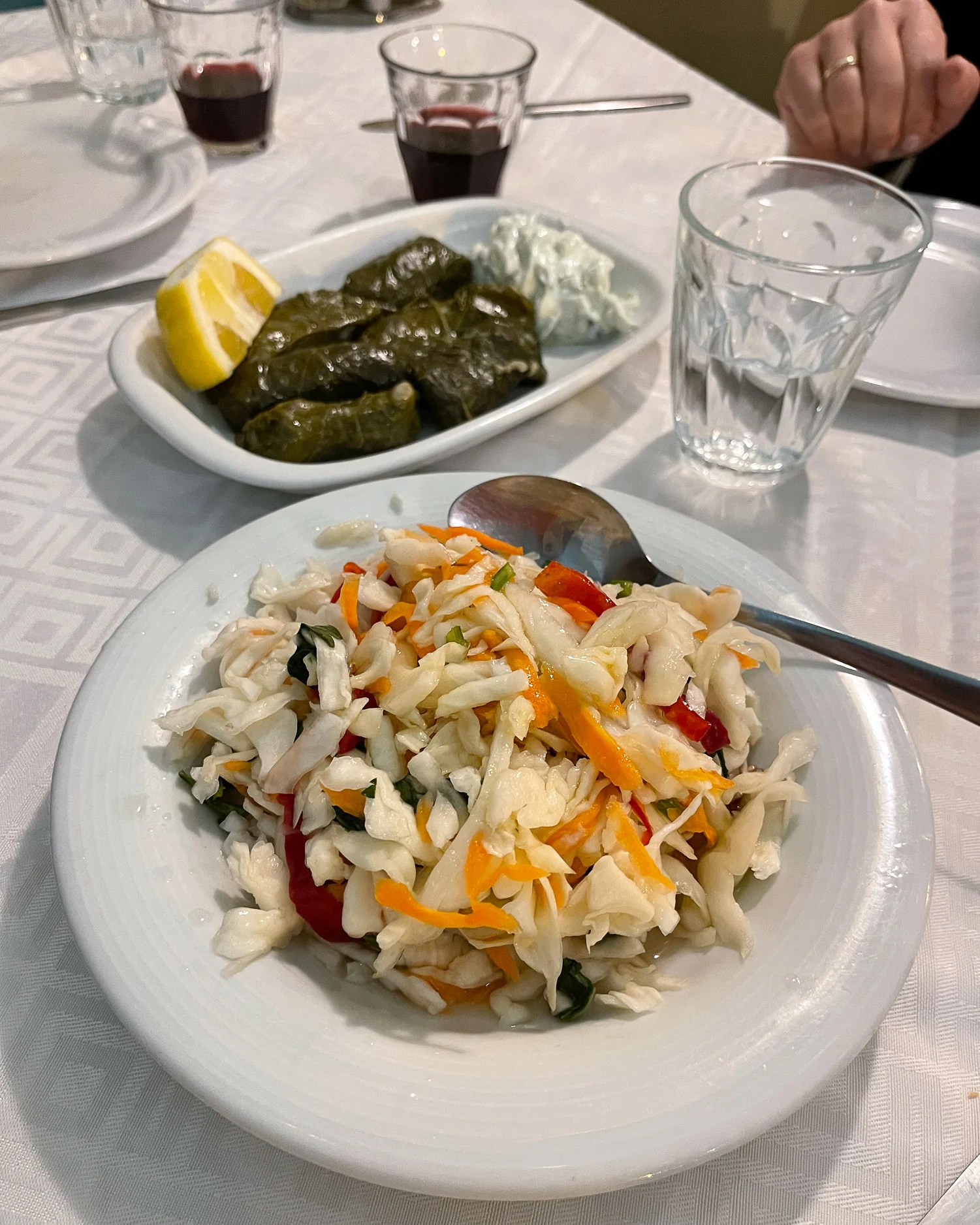
Piperies Florinis – the famous horn shaped red peppers from nearby Florina, are often stuffed with cheese and then baked in the oven.
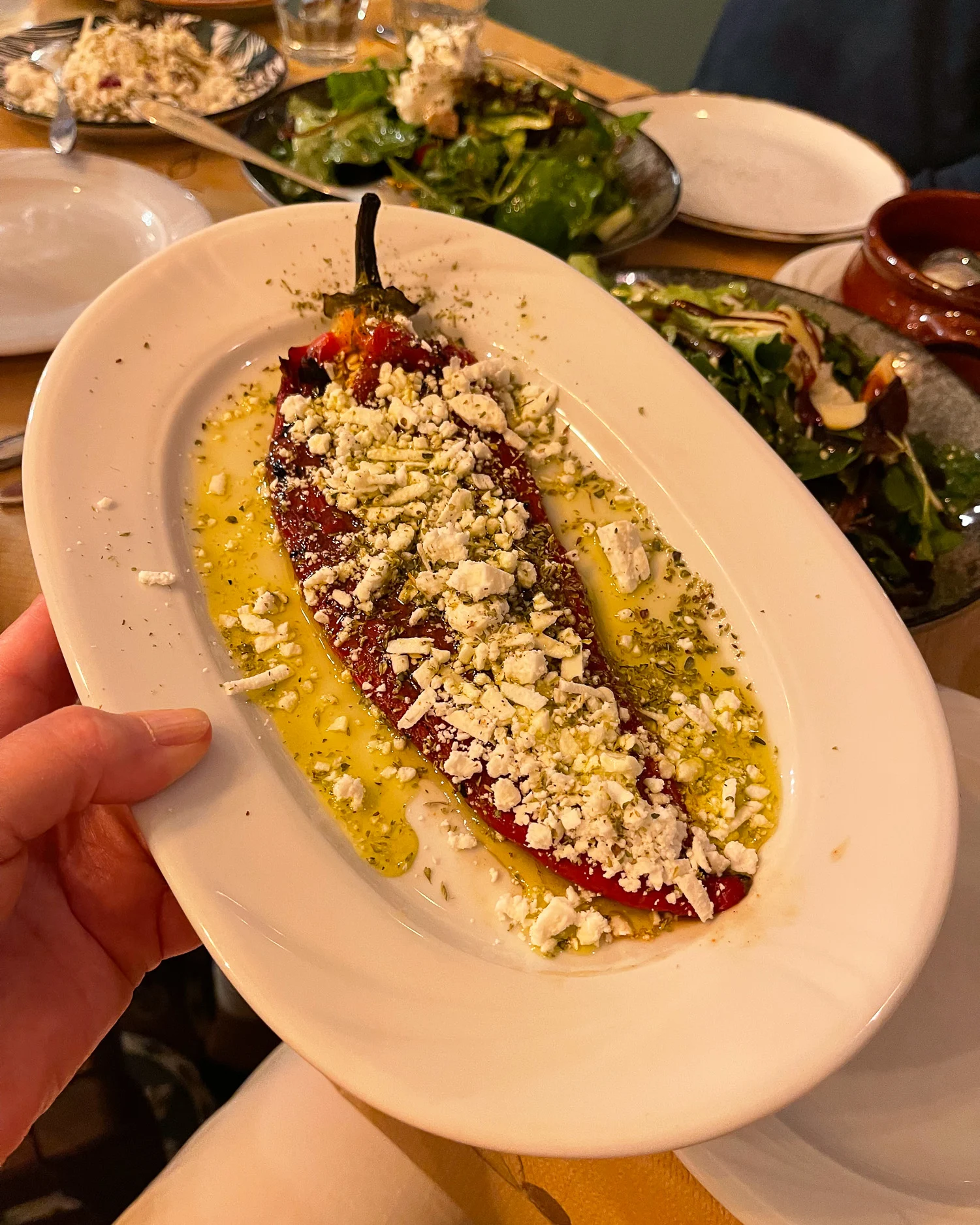
Bougiourdi – this typical Thessaloniki dish is made with a sauce of cooked tomato, peppers and olive oil, melted together with feta cheese. It’s all baked in the oven in a metal or terracotta dish and then served sprinkled with herbs and chilli flakes for a bit of extra heat.
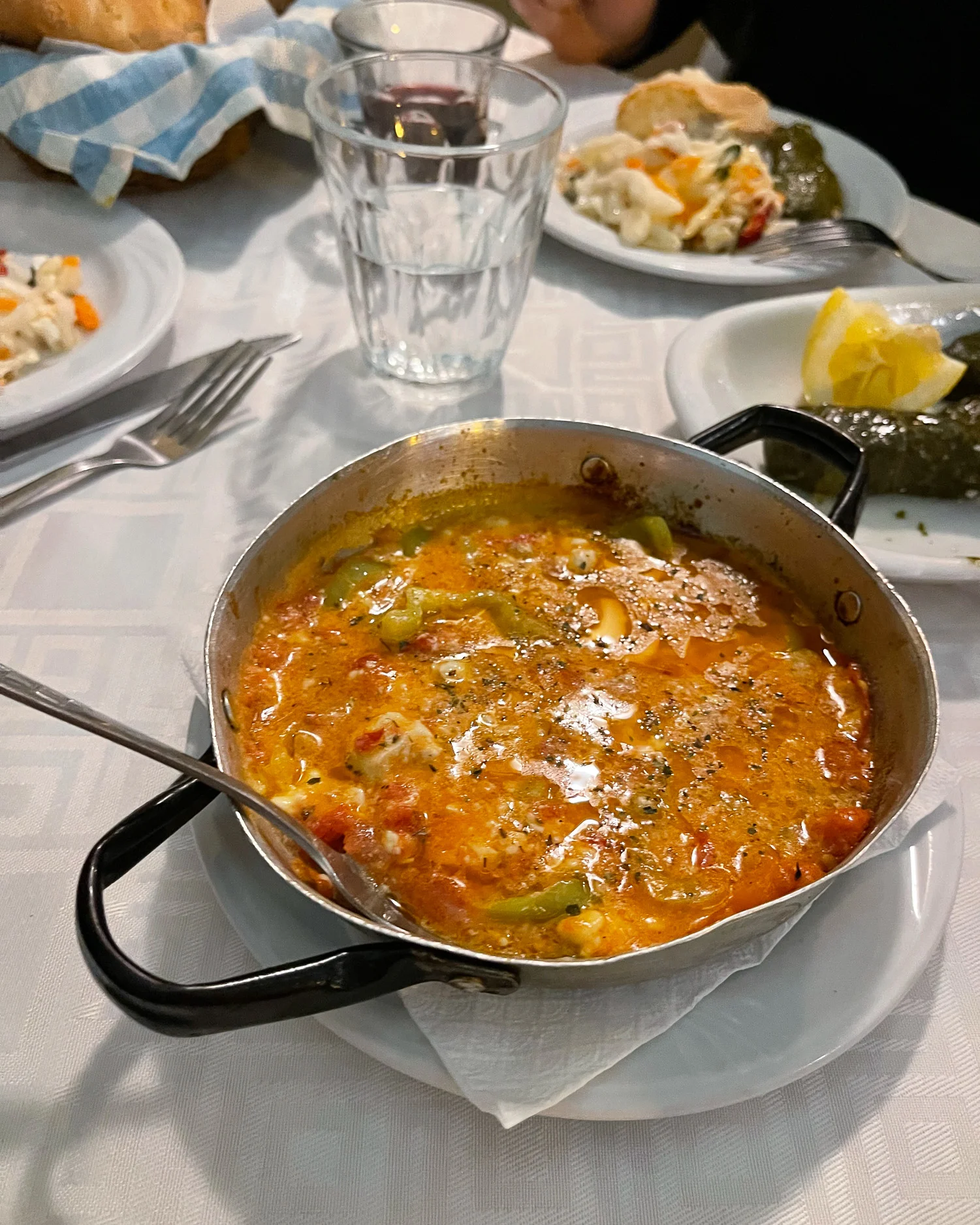
Soutzoukakia Smyrneika – the name translates as meatballs from Smyrna, the city in modern day Turkey (now Ismir). It’s a dish that was brought to the city by Greek refugees in the forced population exchange of 1923. These meatballs have a distinctive oblong shape and are flavoured with cumin, garlic and cinnamon, then cooked in a tomato sauce.
In Thessaloniki you’ll find them on the menu of traditional Greek restaurants and grill houses, such as Diagonios (Stratigou Kallari 13 near the White Tower) or Diaviasi (P.Mela 13 ).
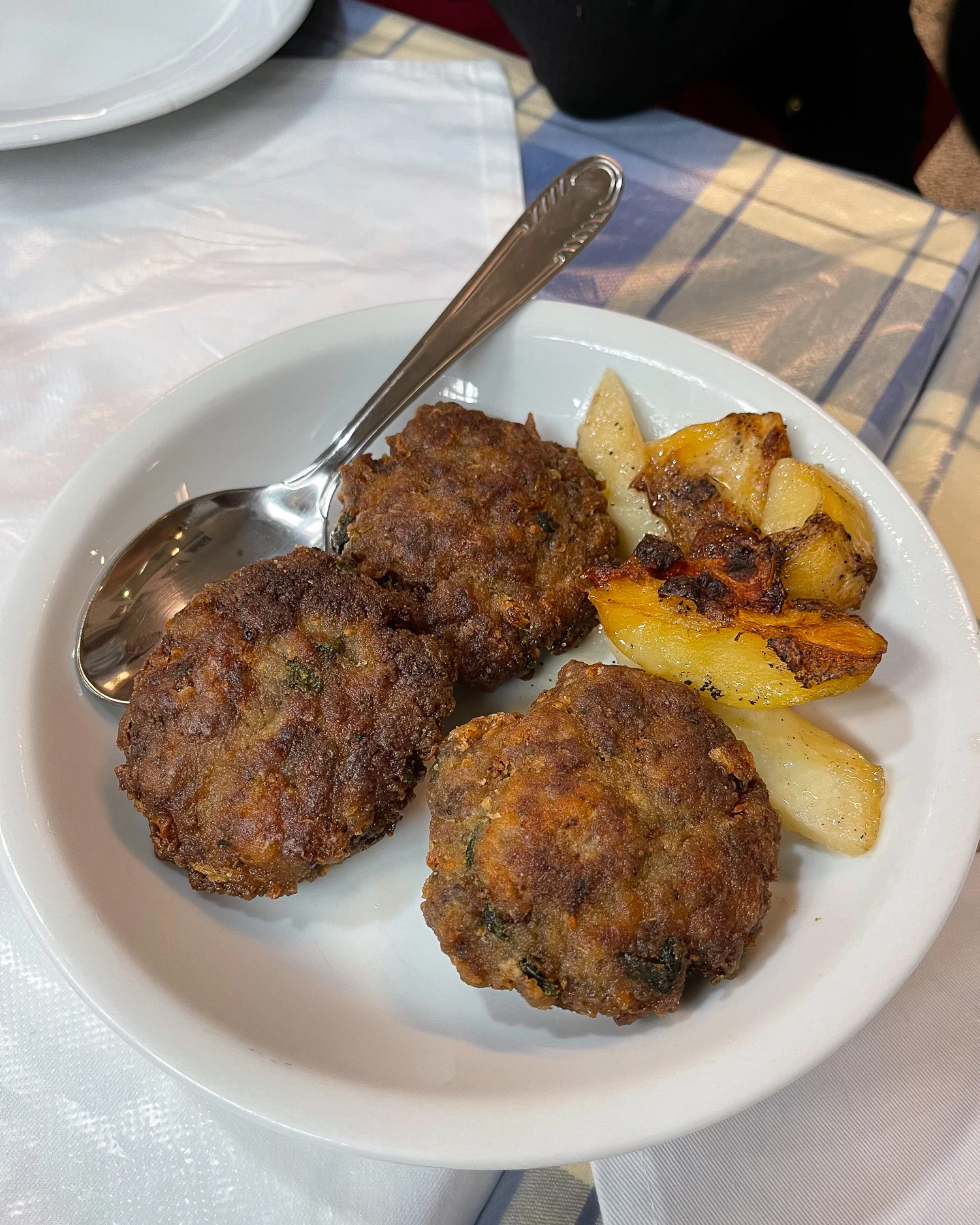
Wines in Thessaloniki
Contrary to their rather lacklustre international reputation, Greek wines are excellent and far superior to the carafe of retsina you might have tried on holiday. Close to Thessaloniki are several vineyards that can also be visited.
The family owned vineyard of Ktima Gerovassiliou is located around 30 mins drive from Thessaloniki in the area of Epanomi . This winery can be visited for a 60 minute tour every day except Tuesdays when the vineyard is closed.
Tours are lead by a wine guide and include the vineyard, production and bottling areas and the Wine Museum which has a huge collection of corkscrews. Wine tastings are available costing from €15 and are flexible depending on the level of wines you want to taste.
Nearby is Domaine Florian a family run boutique winery that also produces olive oil, honey and Mediterranean herbs. The winery offers a wine tasting bar and an informal tour of the farm, with the third winery in this area being Voulgari winery.
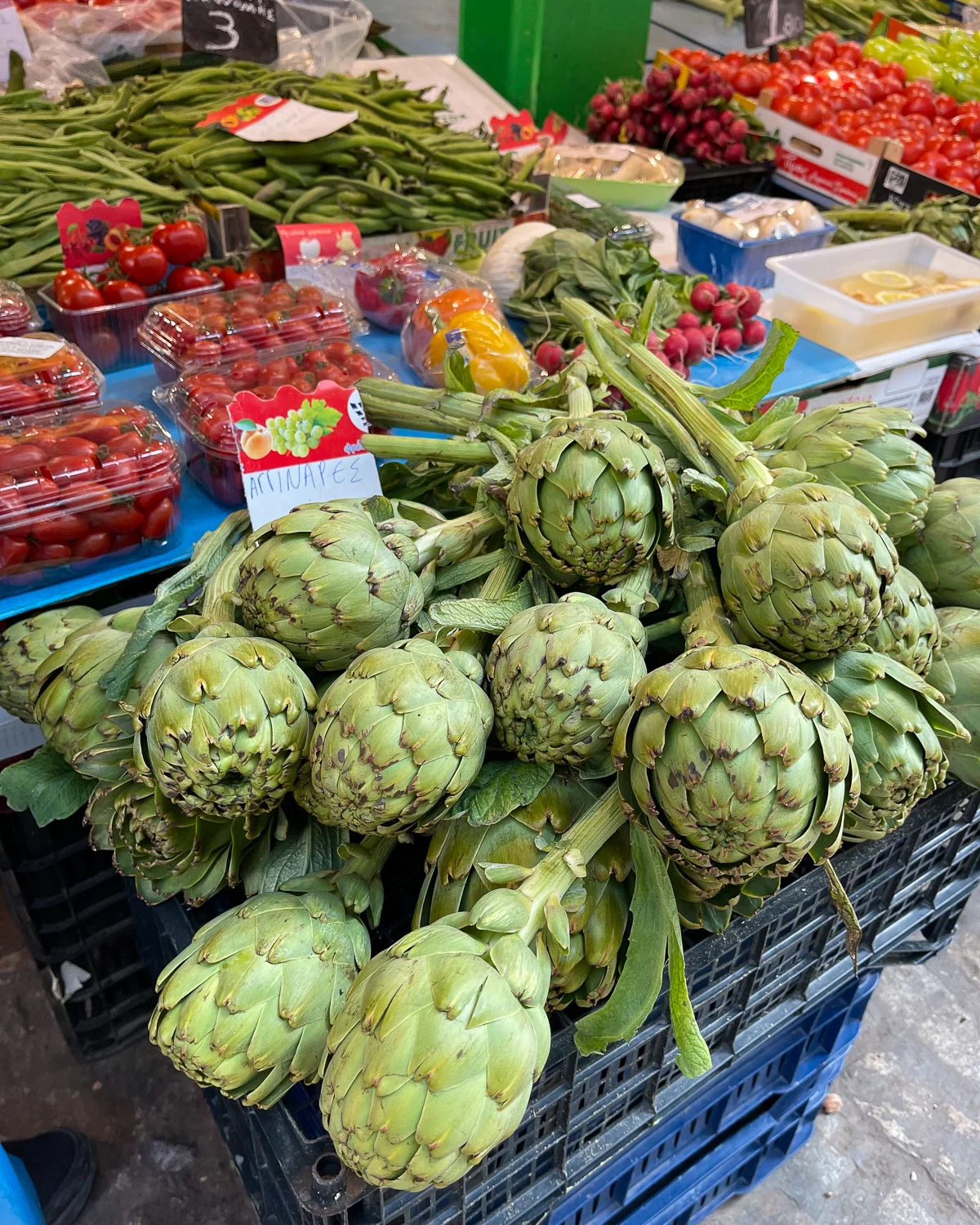
Food festivals in Thessaloniki
If you happen to be visiting Thessaloniki in May, look out for the Street food festival run by Soul Food Thessaloniki in the TIF Thessaloniki international trade fair close to the University and Archaeological Museum. The Thursday-Sunday event offers 30 street food stalls as well as 2 live music stages.
Soul Food Thessaloniki also run a beer festival in early September, also at the TIF centre.
Food tours in Thessaloniki
We can recommend these tours of Thessaloniki as a relaxing way to explore the city and its food culture.
Culinary walking tour of Thessaloniki – This 3 hour tour which we tried takes you around the markets and specialty food shops with multiple tastings and a lunch in one of the traditional tavernas. *tried and tested by us!*
Walking open market food tour and tasting – This 2 hour walking tour takes you to the open air markets of Thessaloniki to try a Greek coffee and sample some of the traditional foods and produce.
Thessaloniki Bike tour – If you like to stay active, this 3 hour tour takes you cycling around some of the city highlights.
Our top picks for hotels in Thessaloniki

The Electra Palace is a luxury hotel with rooftop restaurant and pool, in a prime position overlooking the main square

Stay at The Excelsior – a small luxury hotel in a neoclassical building with a central location

Colors Urban Hotel – a colourful modern hotel with urban style in the Ladadika neighbourhood

The Caravan is a colourful and stylish small hotel with vintage touches close to the Roman Forum

Stay at 7PocketHouse – a charming budget guest house with vintage style in Ano Poli
More places to visit in Greece
Visit Skopelos Greece – a guide to the Mamma Mia Island
A guide to the Pelion Greece – from the mountains to the sea!
Food in Athens – 23 dishes and food experiences you’ll want to try!
Pin it!
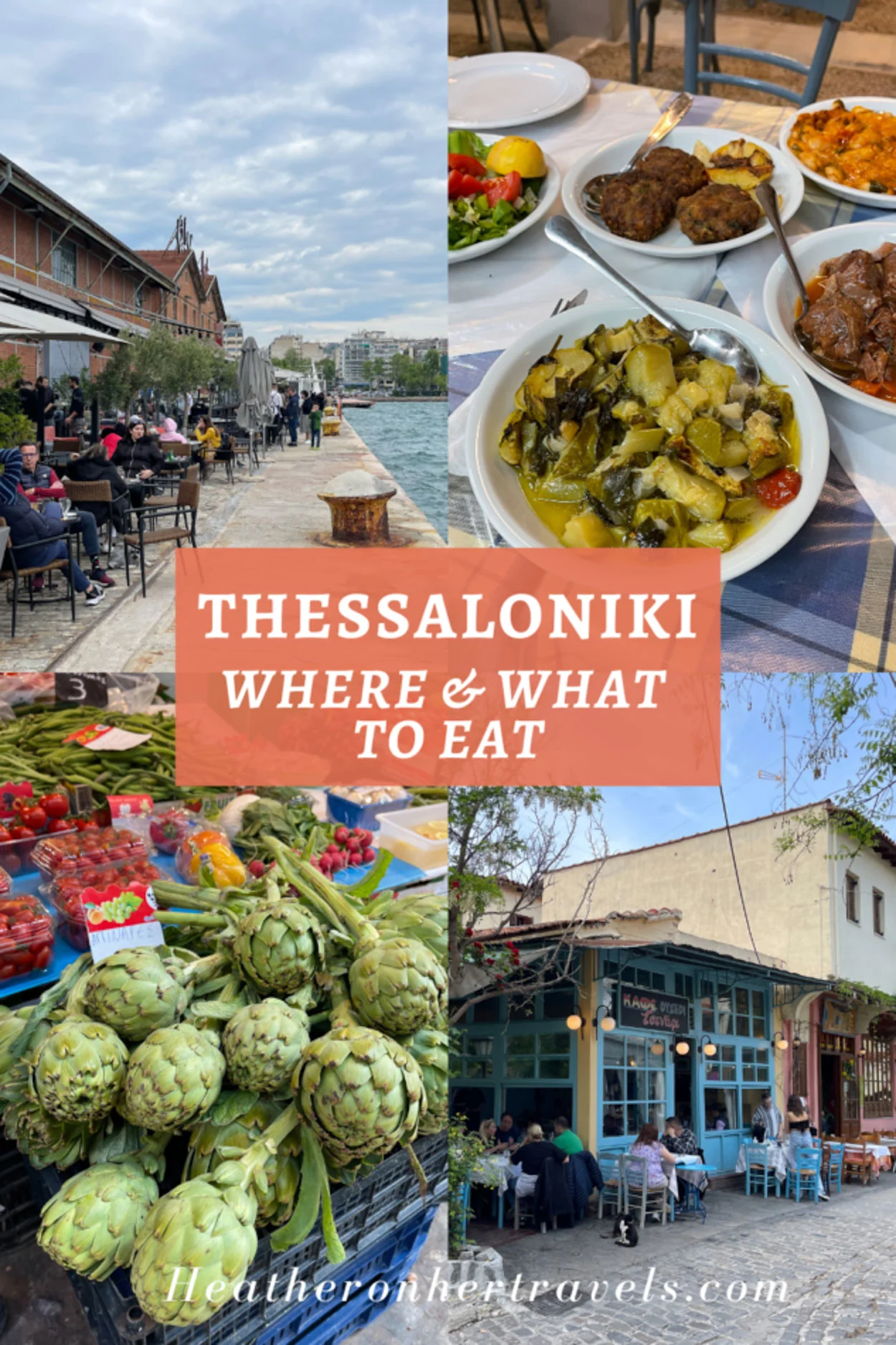
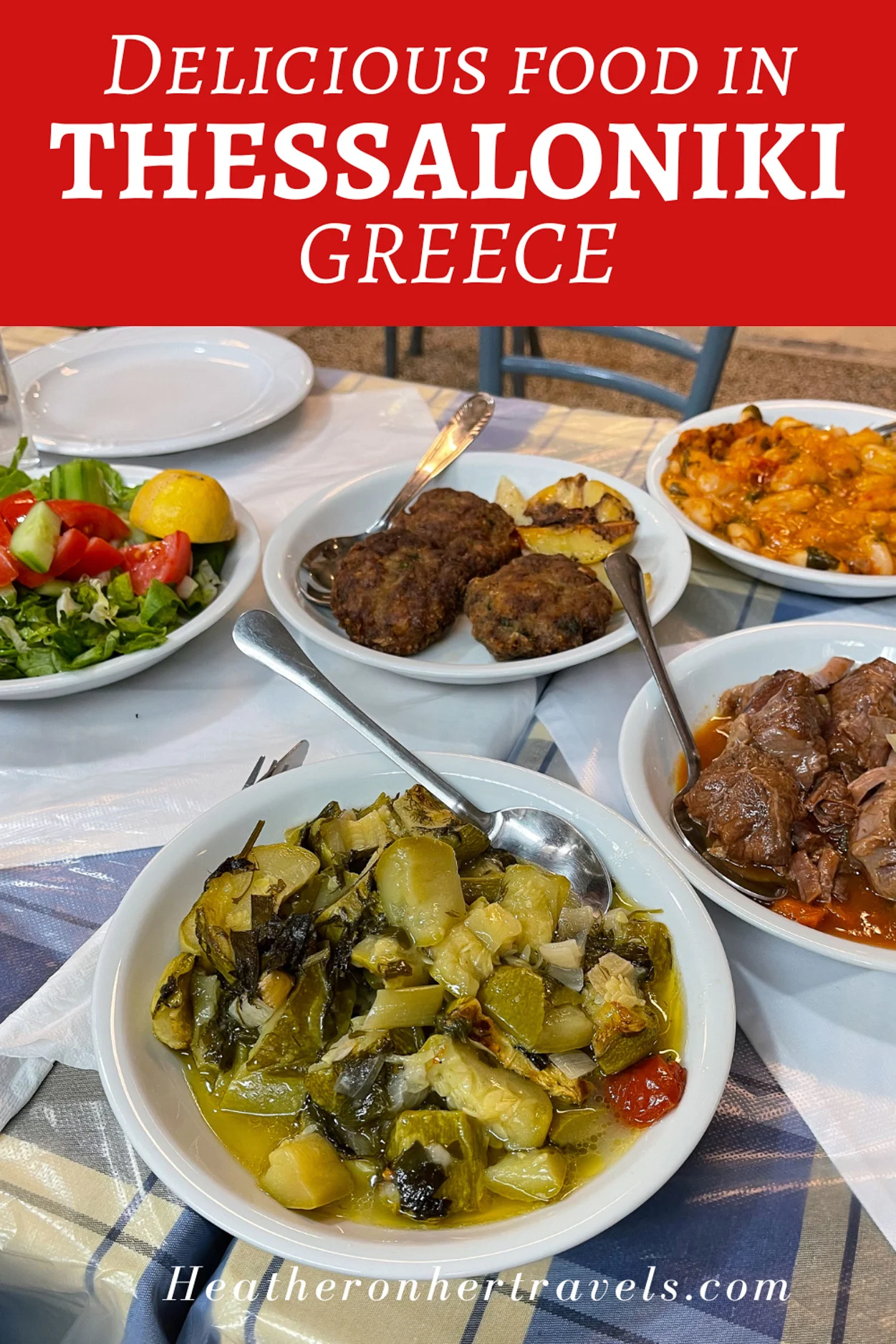
This article is originally published at Heatheronhertravels.com
Never miss an update! – Subscribe to receive our latest articles and newsletter
All photography and text in this article is Copyright to Heather Cowper / Heatheronhertravels.com and may not be reproduced without permission.


